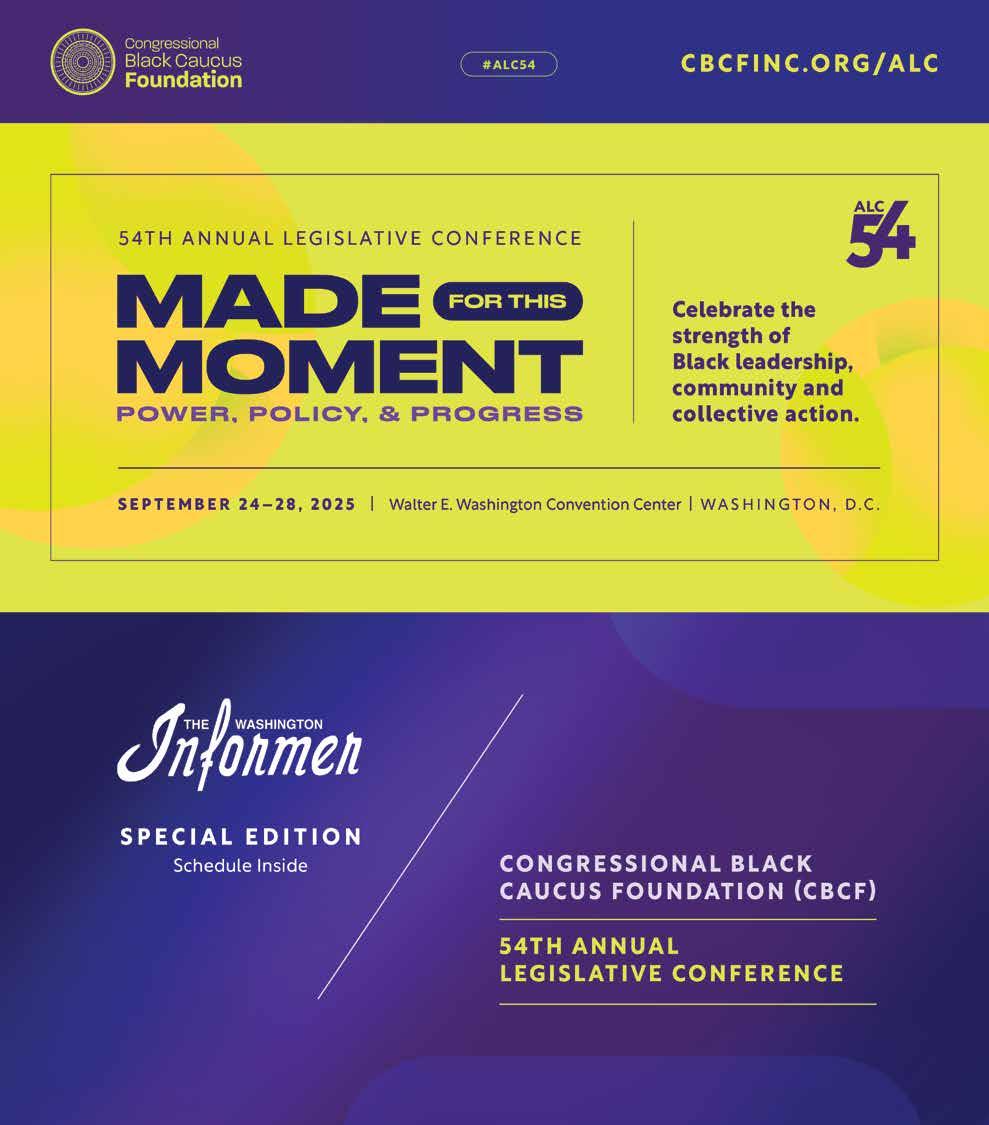





READ THE WASHINGTON INFORMER YOUR WAY:
n In Print – feel the ink between your fingers of our Award Winning Print Edition
n On the Web – www.washingtoninformer.com updated throughout the day, every day
n On your tablet
n On your smartphone
n Facebook
n Twitter
n Weekly Email Blast – sign up at www.washingtoninformer.com

202-561-4100


For advertising contact Ron Burke at rburke@washingtoninformer.com ...Informing you everyday in every way

In Memoriam Dr. Calvin W. Rolark, Sr. Wilhelmina J. Rolark
PUBLISHER
THE WASHINGTON INFORMER NEWSPAPER (ISSN#0741-9414) is published weekly on each Thursday. Periodicals postage paid at Washington, D.C. and additional mailing offices. News and advertising deadline is Monday prior to publication. Announcements must be received two weeks prior to event. Copyright 2016 by The Washington Informer. All rights reserved. POSTMASTER: Send change of addresses to The Washington Informer, 3117 Martin Luther King, Jr. Ave., S.E. Washington, D.C. 20032. No part of this publication may be reproduced without written permission from the publisher. The Informer Newspaper cannot guarantee the return of photographs. Subscription rates are $45 per year, two years $60. Papers will be received not more than a week after publication. Make checks payable to:
THE WASHINGTON INFORMER
3117 Martin Luther King, Jr. Ave., S.E Washington, D.C. 20032
Phone: 202 561-4100
Fax: 202 574-3785
news@washingtoninformer.com
www.washingtoninformer.com
Denise Rolark Barnes
STAFF
Micha Green, Managing Editor
Ron Burke, Advertising/Marketing Director
Shevry Lassiter, WIN-TV Producer
Ra-Jah Kelly, Digital Asset Manager
Lafayette Barnes, IV, Editor, WI Bridge DC
Desmond Barnes, WIN Daily Editor
Anthony Tilghman, Social Media Strategist ZebraDesigns.net, Graphic Design
Mable Neville, Bookkeeper
Angie Johnson, Office/Circulation Manager
Jada Ingleton, Content Editor
REPORTERS
Stacy Brown, National Reporter
Sam P.K. Collins, Political/Education Reporter
Brenda Siler, Lifestyle Reporter
Ed Hill, Sports Reporter
Richard Elliott, Reporter
James Wright, Business Reporter
Skylar Nelson, Sports Reporter
Mya Trujillo, Environmental and International Reporter
PHOTOGRAPHERS
Shevry Lassiter, Photo Editor
Ja Mon Jackson, Asst. Photo Editor
Roy Lewis, Jr.
Robert R. Roberts
Anthony Tilghman
Abdullah Konte
Cleveland Nelson
INTERNS
Keith Golden Jr., Fall Intern




Nicole Austin-Hillery President & CEO Congressional Black Caucus Foundation
As we come together in Washington, D.C. for #ALC54, I want to extend my warmest welcome to every participant. For more than five decades, the Annual Legislative Conference (ALC) has been the place where our community convenes to confront challenges and chart solutions. It is where wisdom meets fresh ideas, where strategies take shape, and where our collective power is affirmed. This is more than a conference; it is a declaration that we will not retreat, that we are ready to lead, and that we are committed to building a future defined by justice and opportunity. What makes this year different is not simply the content of the agenda but the urgency of the moment. We Are Made for This Moment is more than a theme; it is a declaration of resilience and readiness.
Every September, ALC draws between 10,000 and 15,000 participants from all 50 states, including the District of Columbia, and across the globe, making it the largest policy forum dedicated to issues that shape the lives of Black communities worldwide. With over 100 sessions, this year’s ALC will take on topics that cut to the core of justice and well-being. Panels will explore how to better protect Black women and girls, how lessons from Ferguson and Baltimore can lead to more accountable systems, and how food and nutrition can be treated as central to healthcare.
Together, we will address the tough questions: How do we strengthen democracy? How do we close health and wealth gaps? How do we protect our communities and prepare future generations for leadership? These conversations will not remain in meeting rooms; they are designed to translate into action and lasting change.
We also recognize the concern many have expressed about heightened law enforcement activity in Washington, D.C. Let me be clear: your safety is our priority. We are working closely with the Walter E. Washington Convention Center and local officials to maintain a secure environment. Additional security measures are in place both at the convention center and at offsite events to ensure that all who attend feel comfortable and protected. At this time, we do not anticipate law enforcement presence beyond what is typically deployed for a gathering of this size, and our team remains vigilant and ready to adjust if needed. ALC’s impact extends far beyond the convention center walls. The conference contributes millions of dollars to the city through hotels, restaurants, transportation, and local businesses, many of them Black-owned. This means that when we gather, we not only strengthen our political and social capital but also fuel the economic vitality of Washington, D.C.
Let this week be a powerful reminder of what happens when we gather as a community determined to shape a just and equitable future. Around us, the challenges to democracy and equality grow more urgent, but within us lies the courage to meet them. The Congressional Black Caucus Foundation is here to ensure that. Together, we will learn, lead, and carry forward the enduring legacy of the Congressional Black Caucus. We ARE made for this moment.
Have a great week!


By Yolanda Raine Vice President of Marketing and Communications Congressional Black Caucus Foundation
Each year, the Congressional Black Caucus Foundation (CBCF) convenes its Annual Legislative Conference (ALC) to create space for dialogue, solutions, and empowerment around the most pressing issues facing the Black community. As we enter the 54th year of this convening, our theme — Made for This Moment: Power, Policy, & Progress — speaks not only to the urgency of the time we live in, but also to the resilience and brilliance of Black people across generations.
From the moment the founding members of the Congressional Black Caucus (CBC) came together in 1971 to demand recognition and representation, our community has understood what it means to be “made for the moment.” We carry the legacy of leaders who turned pain into policy, struggle into strength, and barriers into bridges.
That legacy is alive today as we navigate a complex political landscape under the current administration. The Black community finds itself on the front lines of multiple policy battles: protecting voting rights in the face of ongoing suppression efforts, ensuring economic opportunity amid rising inequality, defending affirmative action and diversity initiatives that are under attack, and demanding accountability in policing and the criminal justice system. The rollbacks on DEI programs across sectors remind us that progress is never guaranteed, and our voices and advocacy are more essential than ever. At the same time, we are pressing for policies that expand health care access, close the racial wealth gap, and confront the climate crisis — issues that disproportionately impact our communities.
This moment is not unfamiliar. History reminds us that Black progress has often come in times of deep uncertainty. The Civil Rights Movement, Reconstruction, and the Harlem Renaissance — each moment was born out of our sheer will to overcome and build a better world. Today is no different. Whether we are pushing back against threats to democracy, advocating for economic mobility, or reimagining what justice looks like, Black people continue to lead and inspire change in ways that echo our ancestors’ call to keep moving forward.
For me, this year’s theme carries deep personal significance. Named after Dr. Martin Luther King Jr.’s daughter, I am grounded in knowing, inextricably, my life links to the unfinished work of justice and equality. I grew up in Warrensville Heights, Ohio—a suburb of Cleveland, Ohio where Attorney and former U.S. Secretary of Housing and Urban Development Marcia Fudge once served as mayor—a community that instilled in me the values of service and perseverance. I am a proud alumna of Case Western Reserve University, where trailblazers like the late Congresswoman Stephanie Tubbs Jones and Congressman Louis Stokes also matriculated. Today, I attend New Bethel Baptist Church in Washington, D.C., once pastored by Walter E. Fauntroy, a founding member of the Congressional Black Caucus.
I also had the blessing of studying under the leadership of Dr. Barbara Williams-Skinner, former executive director of the CBC, through the Master Series for Distinguished Leaders. And in my career journey, I contributed to the YWCA, an organization where Dr. Dorothy I. Height was instrumental in shaping its racial justice work and whose influence still reverberates across movements for equity and liberation.
These legacies are not coincidences — they are reminders that I, too, am made for this moment. As Vice President of Marketing and Communications at CBCF, my work is about more than strategy and storytelling. It is about carrying forward these histories, amplifying the voices of Black leaders, and shaping narratives that affirm our collective power.
As we gather for ALC 54, let us remember that being “made for this moment” is not a slogan — it is a charge. It is a recognition that the collective power of Black people, when rooted in policy and propelled by progress, has always transformed this nation. And it will continue to do so.
WI
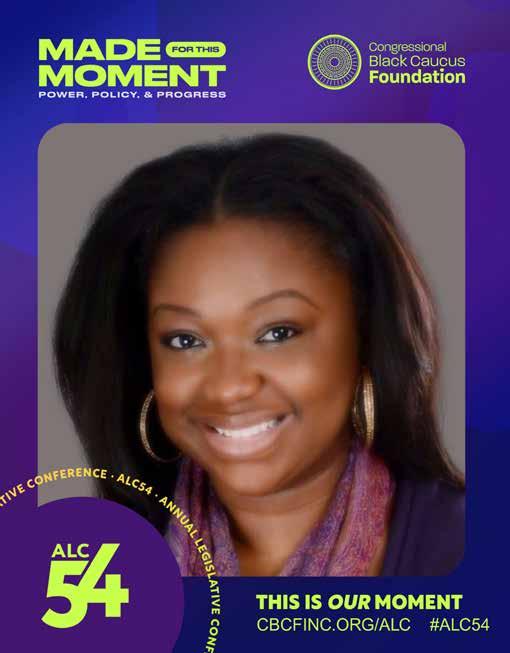





TUESDAY, SEPTEMBER 23, 2025
10:00 AM – 3:00 PM P/CEO Stakeholder Leadership Summit
WEDNESDAY, SEPTEMBER 24, 2025
7:00 AM – 7:00 PM Registration | Ticketing
8:30 AM – 4:30 PM CBCF Professional Development Series
9:00 AM – 6:30 PM Issue Forums & Established Braintrusts
WCC (145B)
WCC (East Salon)
WCC (201 – 202AB)
WCC (Session Rms & BLRM ABC)
10:30 AM – 11:30 AM Opening Press Conference Sycamore & Oak 1110 Oak Dr SE Suite 9
11:30 AM – 7:00 PM Exhibit Showcase WCC (Hall D)
12:00 PM – 1:00 PM Corporate Lounge Opening (Verizon)
WCC (204AB)
12:00 PM – 1:30 PM Attendee Welcome Lunch WCC (Hall D)
12:00 PM – 2:00 PM Exhibit Hall Grand Opening Block Party
WCC (Hall D)
2:00 PM – 3:00 PM New Attendee Welcome WCC (207B)
3:00 PM – 3:30 PM CBC Spouses Essay Contest and Issue Forum
4:00 PM – 5:00 PM ALC Co-Chairs Reception
WCC (Virtual Only)
Ballroom South Prefunction
5:00 PM – 7:00 PM ALC Welcome Reception honoring the Members of the CBC WCC (Hall D)
8:00 PM – 10:00 PM Alumni Association Networking Reception (IO; 21+ only) WCC (Ballroom C)
THURSDAY, SEPTEMBER 25, 2025
7:00 AM – 7:00 PM Registration | Ticketing WCC (East Salon)
7:30 AM – 10:30 AM CBC Spouses Community Breakfast and Health Fair
Shiloh Family Life Center 1510 9th St NW
9:00 AM – 11:30 AM ALC National Town Hall Meeting WCC (Ballroom AB)
10:00 AM – 5:00 PM HBCU College Fair
WCC (Hall D Concourse)
9:00 AM – 7:00 PM Exhibit Showcase WCC (Hall D)
11:30 AM – 6:00 PM Issue Forums & Established Braintrusts WCC
12:00 PM – 2:00 PM Exhibit Hall Block Party / Fashion Show
4:00 PM – 5:30 PM CBC Staff Appreciation Reception
WCC (Hall D)
Middle Building (Outside of 145)
6:00 PM – 8:00 PM Leadership Reception – CBC Chair’s Reception (IO) Portrait Gallery Great Hall + Luce
8:00 PM – 10:00 PM Gospel Extravaganza
United House of Prayer (UHOP)
8:00 PM – 12:00 AM The Sojourner Truth Women’s Leadership Reception* (IO) Portrait Gallery
#ALC54 | 54TH ANNUAL LEGISLATIVE CONFERENCE |
FRIDAY, SEPTEMBER 26, 2025
7:00 AM – 6:00 PM Registration | Ticketing WCC (East Salon)
9:00 AM – 6:00 PM Issue Forums & Established Braintrusts WCC
9:00 AM – 6:00 PM Exhibit Showcase WCC (Hall D)
12:00 PM – 2:00 PM Exhibit Hall Block Party / Fashion Show WCC (Hall D)
4:00 PM – 6:00 PM CAC Reception WCC (Outside of 204AB)
6:30 PM – 8:30 PM Legacy Reception – CBCF Chair & BOD Reception Conrad Hotel
9:00 PM – 1:00 AM The Black Party* (Ticketed Event; 21+ only) Hamilton Hotel
SATURDAY, SEPTEMBER 27, 2025
6:00 AM – 12:00 PM Registration | Ticketing WCC (East Salon)
7:30 AM – 10:00 AM Day of Healing* (Ticketed Event) (doors open at 7:00 am) WCC (Hall E)
9:00 AM – 1:00 PM Exhibit Showcase WCC (Hall D)
2:00 PM – 9:00 PM Phoenix Awards Tickets Will Call WCC (East Salon)
5:00 PM – 6:00 PM Phoenix Awards VIP Pre-Dinner Reception (IO) WCC (Hall D)
7:00 PM – 9:30 PM Annual Phoenix Awards Dinner* (Ticketed Event) (doors open at 6:00 pm) WCC (Hall E)
9:30 PM – 11:00 PM Official Phoenix Awards After Party* (Ticketed Event) WCC (Hall D)
SUNDAY, SEPTEMBER 28, 2025
10:45 AM – 2:30 PM Donald M. Payne Sr. Foreign Policy Fellowship Cruise (IO) Pier 4–City Cruises at the Wharf 580 Water Street SW
Legend: IO (Invitation Only), Ticketed Event - Tickets available for sale online at registration site (until capacity is reached). WCC (Walter E. Washington Convention Center) **Schedule subject to change


By Mya Trujillo WI Contributing Writer
Since 1970, the Congressional Black Caucus Foundation’s (CBCF) Annual Legislative Conference (ALC) has used its forums to discuss and devise plans to address policy issues affecting Black Americans, using annual themes to guide programming in a direction relevant to encouraging equity amid current political concerns.
Amid the Trump administration’s cuts to diversity equity, and inclusion, efforts to erase Black history, and policies with detrimental effects for Black people, the 2025 ALC’s theme, “Made for this Moment: Power, Policy and Progress,” aims to empower African Americans and government personnel to remain vigilant and motivate them to take action in protecting their rights.
“This year's theme, 'Made for This Moment: Power, Policy, and Progress,' captures the urgency and responsibility we face as a nation,” said CBCF President Nicole Austin-Hillery. “This moment calls for bold leadership, collaboration, and action, and this conference provides the platform to make that happen.”
This year’s ALC theme will further explore how Black Americans are continuing the legacy left by their ancestors and highlight how the CBCF can play a large role in positively impacting current and future political, social and economic climates.
CBCF organizers hope the event inspires communities to make collective efforts toward changing the political landscape in a way that will ensure democracy and justice are at the forefront of lawmakers’ minds, equipping the masses with the tools necessary to build a better future.
“Next year is a midterm election year, and I hope that [the ALC] encourages people to galvanize and fully participate in the electoral process. That is how our voices are heard and how they resonate in a democracy — through showing up, engaging, and ensuring that our communities are represented at every level of government.” Yolanda Raine, CBCF vice president of marketing and communications, told The Informer.


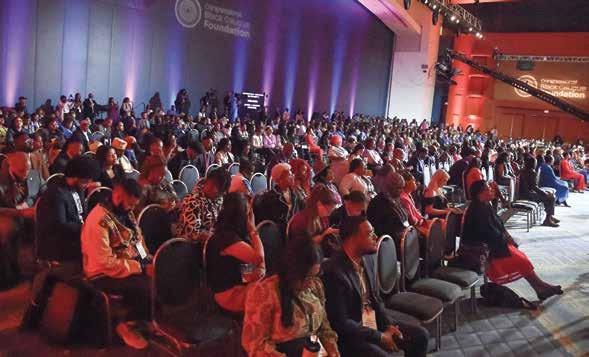
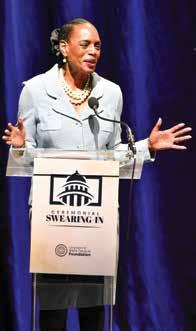
Even though D.C. Rep. Oye Owolewa’s position as a shadow representative doesn’t provide him the opportunity for CBC membership, he has enthusiastically participated in the events and programming during CBCF’s ALC week for years.
Owolewa hopes this year’s program will directly inspire Black leaders to use their influence to defend the rights of Americans living in the nation’s capital, especially
5 Attendees at the 2024 Congressional Black Caucus Foundation (CBCF) Annual Legislative Conference (ALC). Amid the Trump administration’s cuts to diversity equity, and inclusion, efforts to erase Black history, and policies with detrimental effects for Black people, the 2025 CBCF ALC theme is: “Made for this Moment: Power, Policy and Progress.” (WI File Photo/Robert R. Roberts)
3Congressional Black Caucus Foundation President Nicole Austin-Hillery at the 2025 Congressional Black Caucus swearing in ceremony in January. Austin-Hillery says this year’s theme, 'Made for This Moment: Power, Policy, and Progress,' speaks to the urgency of the time and the responsibility Americans have during this time. (WI File Photo/Robert R. Roberts)
in the wake of President Donald Trump’s federal takeover of the District. During this occupation of the nation’s capital, approximately 800 National Guard personnel have been deployed, with reportedly hundreds more from Mississippi, West Virginia, Ohio and South Carolina pledging to join.
“I believe these conferences are valuable in bringing Black leaders together,” Owolewa told The Informer. “With everything going on locally in D.C…. I believe it’s important for our country’s leaders to find courses of action to fight back against Trump’s authoritative actions.”
The D.C. representative also hopes that this year’s conference will push local leaders to further advocate for and protect their vulnerable communities, especially when cuts to the city’s Fiscal Year 2026 Budget could jeopardize Washingtonians’ access to various resources.
“I believe it’s time for D.C. lead-
ership to look inward to find ways to better support our working and middle class,” Owolewa said. “This year, our leadership passed a budget that kicks 25,000 working-class people off Medicaid, cut social services and largely ignored environmental investments.”
Owolewa’s concerns at the local level mirror broader threats to democracy and civil rights under the Trump administration.
Since returning to office, Trump has pledged to remove accurate American history from schools and Smithsonian institutions, claiming that teachings and depictions of Black Americans’ struggles throughout the country’s history erode critical thinking. The president also introduced the Safeguard American Voting Eligibility (SAVE) Act, which could limit voting access with its intense documentation requirements.
These proposals, alongside many others, pose a risk to the rights of in-
dividuals across the nation, dismantling historic progress in the fight toward a just future. Programming at the 54th ALC will bring these current issues and many others to the forefront.
“We’re talking about how children will have access to quality education, equitable education and education that doesn’t erase our history as a community,” Raines told The Informer. “We’re also going to talk about the ways we can protect our health and champion health equity… and democracy, especially when our voting rights and other rights are under threat.”
As the ALC has historically pushed Black leadership to preserve Black Americans’ Constitutional rights, the conference also aims to influence future generations of Black policymakers and organizers to remain hopeful and determined to work toward a future that fairly considers everyone’s needs regardless of race, class or gender.
“I hope it challenges people to execute on bold ideas that they may have and may be afraid to do, for the sake of… equity for Black folks,” Raines said. “I hope that people walk out of all of our sessions and brain trust and issue forums with information that's pivotal to their work, whether that be new data or new insights from CBCF. "
Owolewa acknowledges the importance of this year’s ALC theme, considering the challenges Black communities have faced since the current administration took office. He hopes Black people across the country are properly equipped to run for and win city, county and municipal elections, ready to remain resolute in the fight to reclaim their power.
“We must prepare and fight for a better tomorrow,” Oweolewa told The Informer. “I’ve been committed to inspire the next generation to step up. I will not be in politics forever, but I know real progress will be made by passing the baton and pushing forward the next generation of leadership.” WI




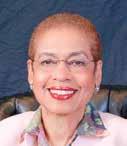
Delegate Eleanor Holmes Norton (D-DC) Serving since 1991
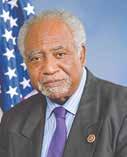
Rep. Danny K. Davis (D-IL-07) Serving since 1997
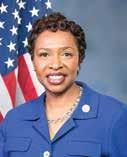
Rep. Yvette D. Clarke (D-NY-09) - Serving since 2007 (CBC 1st Vice Chair)
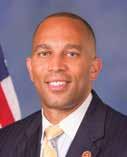
Rep. Hakeem Jeffries (D-NY-08) – Serving since 2013 (Democratic Leader)
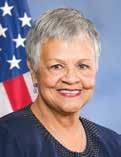
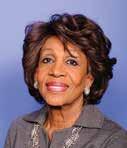
Rep. Maxine Waters (D-CA-43)
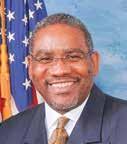
Rep. Gregory W. Meeks (D-NY-05) Serving since 1998
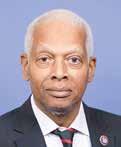
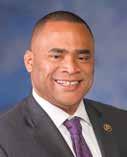
Rep. Marc Veasey (D-TX-33) Serving since 2013
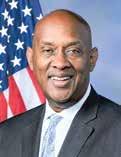


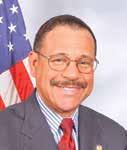

(D-GA-13)
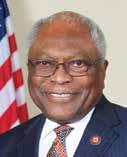

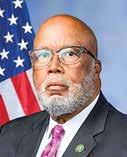
since 1993 Rep. Bennie G. Thompson (D-MS-02)
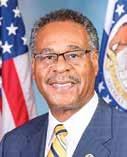
since 2003 Rep. Al Green (D-TX-09)
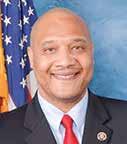
Rep. André Carson (D-IN-07) Serving since 2007
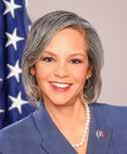
Rep. Robin Kelly (D-IL-02) Serving since 2013
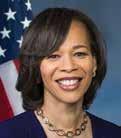

Rep. Frederica S. Wilson (D-FL-24) Serving since 2011


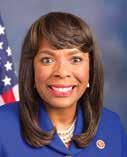
Rep. Terri A. Sewell (D-AL-07) Serving since 2011
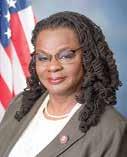
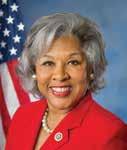
Rep. Joyce Beatty (D-OH-03) Serving since 2012

Rep. Alma Adams (D-NC-12)
Sen. Cory Booker (D-NJ) Serving since 2013
Rep. Sanford D. Bishop (D-GA-02) Serving since 1993
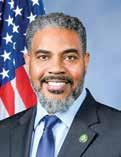
Rep. James E. Clyburn (D-SC-06) Serving since 1993 (Assistant Democratic Leader)


since 2014 Rep. Stacey Plaskett (D-VI)
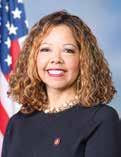
Rep. Bobby Scott (D-VA-03) Serving since 1993
since 2015 Rep. Emanuel Cleaver, II (D-MO-05)


Rep. Ilhan Omar (D-MN-05) Serving since 2018
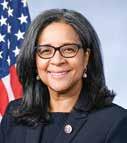
Rep. Marilyn Strickland (D-WA-10) – Serving since 2021 (CBC Whip)

Rep. Don Davis (D-NC-05) Serving since 2023

Rep. Summer Lee (D-PA-12) Serving since 2023
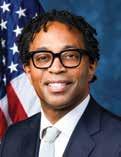
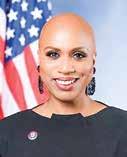
Rep. Ayanna Pressley (D-MA-07) Serving since 2018
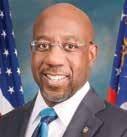
Sen. Raphael Warnock (D-GA) State of Georgia Serving since 2021
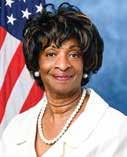
Rep. Valerie Foushee (D-NC-04) Serving since 2023

Rep. Emilia Strong Sykes (D-OH-13) Serving since 2023
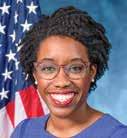
Rep. Lauren Underwood (D-IL-14) – Serving since 2018 (DPCC Co-Chair)

Rep. Troy Carter (CBC 2nd Vice Chair) (D-LA-02) – Serving since 2021
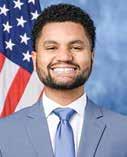
Maxwell Alejandro Frost (D-FL-10) Serving since 2023
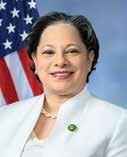
Rep. Jennifer McClellan (D-VA-04) Serving since 2023
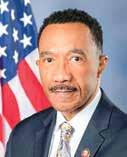
Rep. Kweisi Mfume (D-MD-07) Serving since 2020
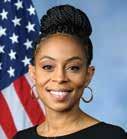
Rep. Shontel Brown (D-OH-11) Serving since 2021
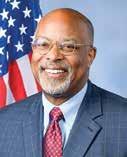
Glenn Ivey (D-MD-04) Serving since 2023
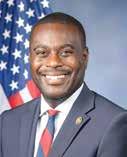
Rep. Gabe Amo (D-RI-1)
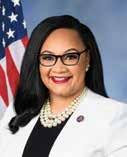
Rep. Nikema Williams (D-GA-05) Serving since 2021
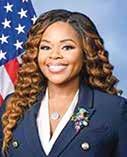
Rep. Sheila Cherfilus-McCormick (D-FL-20) Serving since 2022
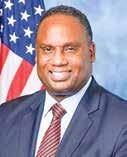
Rep. Jonathan Jackson (D-IL-01) Serving since 2023

Rep. LaMonica McIver (D-NJ-10) Serving since 2024
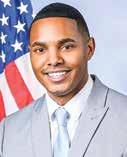
Rep. Ritchie Torres (D-NY-15) Serving since 2021
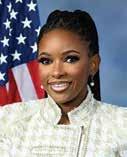
Rep. Jasmine Crockett (D-TX-30) Serving since 2023

Rep. Sydney Kamlager-Dove (D-CA-37) Serving since 2023
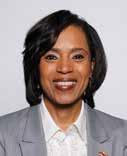
Angela Alsobrooks (D-MD) Serving since 2025

Rep. Bennie G. Thompson (D-MS-02) Serving since 1993
Rep. Wesley Bell (D-MO-1) Serving since 2025
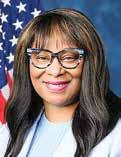
Rep. Janelle Bynum (D-OR-05) Serving since 2025
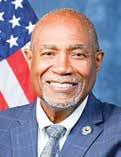
Rep. Herb Conaway (D-NJ-03) Serving since 2025
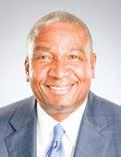
Rep. Cleo Fields (D-LA-06) Serving since 2025
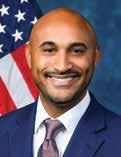
Rep. Shomari Figures (D-AL-02) Serving since 2025
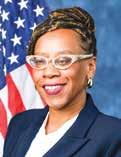
Rep. Lateefah Simon (D-CA-12) Serving since 2025
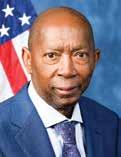
Rep. Sylvester Turner (D-TX-18) In Memoriam


By Richard Elliott, Maven McGann, Hamil Harris and Isaiah Harris WI Contributing Reporter
Since her election to the U.S. Senate last November, Sen. Angela Alsobrooks (D) has stood firm against the Republican agenda while introducing bills to protect consumers and hold the Trump administration accountable.
In her first year in the Senate, she has been a consistent voice against policies that undermine research, public health, national security and efforts to support marginalized communities.
“We see that Medicare and Medicaid are under attack,” said Alsobrooks, who is also serving as co-chair of the 54th Congressional Black Caucus Foundation (CBCF) Annual Legislative Conference, held at the Walter E. Washington Convention Center Sept. 24-Sept. 28. “There is so much under attack. It has been very sobering to see the issues that our country continues to grapple with.”
During confirmation hearings, she questioned now-Health and Human Services (HHS) Secretary Robert Kennedy Jr. regarding his beliefs on health care and vaccines, and challenged his medically racist assertion that African Americans have “stronger immune systems.”
In addition, the Maryland senator demanded Kennedy Jr.’s resignation in May, following cuts to cancer research and a rise in diseases including measles and tuberculosis. In an August press statement, she said the HHS secretary is a “threat to the health and well-being of every American citizen.”
Further, this spring, Alsobrooks also called for the resignation of Defense Secretary Pete Hegseth following the disclosure of classified information via text.
“Are you sick of it? The lies, the cruelty, the incompetence, the immorality, the lack of integrity. Are you sick of Donald Trump and RFK Jr.?” she asked an audience of hundreds gathered out-


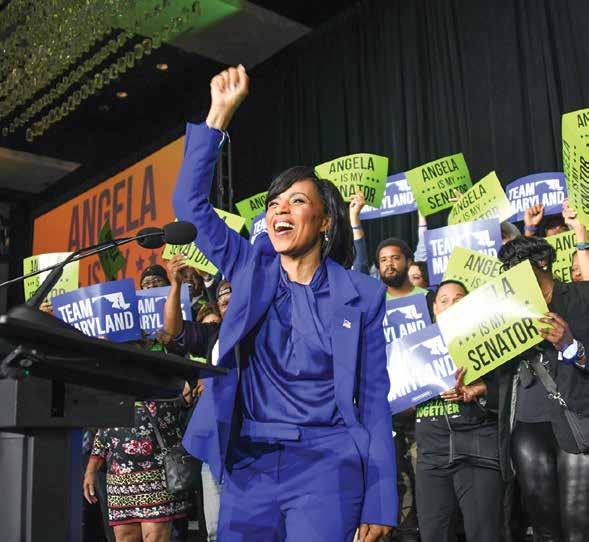
side of the National Institutes of Health (NIH) in May.
Alsobrooks, who significantly reduced violent crime as the Prince George’s State’s Attorney, has also spoken adamantly against the Trump administration’s takeover of the Metropolitan Police Department (MPD) and deployment of the National Guard in Washington D.C.
“The city of Washington D.C. belongs to the great people of Washington, D.C., not the occupant of the White House. If he actually cared about the wellbeing of the people of Washington, he wouldn’t have blocked D.C. from spending its OWN money in the way it saw fit,” said the senator, who touted her longtime working relationship with District Mayor Muriel Bowser (D) and expressed confidence in her ability to lead
MPD. “This is not only drastic executive overreach but the latest marker in how far this President is willing to go to attack our democracy.”
Before becoming Maryland’s first Black senator, Alsobrooks broke barriers as the first woman to serve as Prince George’s county executive from 2018-2024. As leader of Prince George’s, Alsobrooks promoted protecting and expanding opportunities for residents, priorities Capitol Heights Councilmember Victor James is thankful for today.
“During Sen. Alsobrooks’ tenure as county executive, one issue she prioritized was public safety. I
was inspired by her work on this issue, and took courage in hiring more police officers to increase our safety and manpower for the great Town of Capitol Heights citizens. We now have fourteen officers,” James told The Informer.
Capitol Heights also launched a public safety committee.
As she did for the people of Prince George’s as county executive, Alsobrooks seeks to expand opportunities for Maryland families.
“The number one priority is economic opportunities. No matter where I have gone, people need, want and deserve to have the chance to provide for their families, to live in safe and affordable places: all of these things come together as a result of their economic opportunities so more people can enjoy the American
dream,” Alsobrooks told The Informer. “What I really enjoy is working at different levels.”
The first bill she introduced, the Tariff Transparency Act, intended to study the impacts of tariffs on American businesses and consumers. This bill was not advanced out of committee.
Maryland Democratic Sens. Alsobrooks and Chris Van Hollen both signed on to legislation to ban elected officials and their families from financially benefiting from issuing, endorsing, or sponsoring crypto assets, following the usage of $TRUMP to make hundreds of millions for President Trump and business associates.
She also sponsored the GENIUS Act, one of the first national laws to add stability and consumer protections to the emerging market of cryptocurrencies and stablecoins, which passed Congress in July.
“As more Marylanders and Americans participate in this emerging market, it is crucial that we in Congress do not drag our feet. This bill marks a major step forward for Americans participating in the stablecoin marketplace. Without this bill, the public will continue to engage with a rapidly growing industry with no guardrails and no regulatory framework. The GENIUS Act changes that,” Alsobrooks said in a June statement. “I am particularly proud of the language I secured through hard-fought negotiations to protect consumers and community banks.”
While she applauded the passage of the GENIUS Act, she noted the difference between this bill and her accountability and transparency bill.
“This bill does not include everything I would have liked: namely preventing President Trump and his family from using their position to profit off the stablecoin market. To that end, I have co-sponsored the End Crypto Corruption Act,” said the senator in a mid-June press release.



By Marley Dias
Black creativity has always been the heartbeat of social change. Our art resists oppression and reimagines new futures. Yet today, we see the same cycles of erasure return—with book bans rising, murals whitewashed, and public sculptures removed. Black artists and writers are once again being pushed to the margins of culture and power.
As a student-activist and former co-director of the Black Arts Collective at Harvard, I’ve witnessed this erosion firsthand. Serving on the National Racial Equity Initiative (NREI) Task Force for Social Justice has shown me how the civic space shrinks for Black leaders and creatives, especially under creeping authoritarianism.
Book bans and artistic censorship carry real civic consequences. They don’t just erase stories; they starve democracy. Diverse narratives are vital to producing critical thinkers, bold citizens, and equity-minded leaders.
When we suppress that diversity, we fall deeper into cycles of violence and ignorance.
As a literary activist who launched the #1000BlackGirlBooks campaign at age 10, I’ve collected over 16,000 books featuring Black girls as the protagonists. I know what representation means to young readers. And I know what its removal costs.
Today, censorship disproportionately targets Black voices. Books like The Color Purple by Alice Walker and The Hate U Give by Angie Thomas are stripped from libraries—not because they’re poorly written, but because they tell uncomfortable truths about race and power in America.
According to recent NREI and CPAR (Center for Public Action and Research) reports, these bans are part of a broader rollback of civil liberties, especially in states like Florida and Texas. Public memory is under attack—and with it, the identity development and academic success of students of color.

Yet even under threat, Black artists continue to resist. Simone Leigh’s Brick House, once towering over Manhattan’s High Line and now installed at the University of Pennsylvania, is a tribute to the legacy of Black women’s strength, beauty, and ancestral knowledge. Her work affirms what censorship tries to erase: that we belong in public, in power, and in memory.
Cultural institutions thrive when they reflect the full diversity of our society. Supporting artists across race, gender, class, and medium fosters innovation and connection. But the exclusion of Black creatives doesn’t happen by accident. It’s often a policy decision. Dr. Kimberlé Crenshaw, a fellow member of the NREI Task Force, reminds us that representation is not just a cultural concern—it’s tied to access, funding, and curriculum.
Culturally responsive education, which centers students’ racial and historical contexts, has been shown to
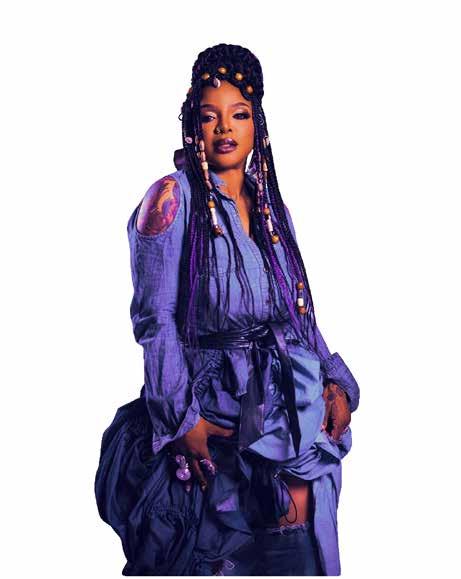
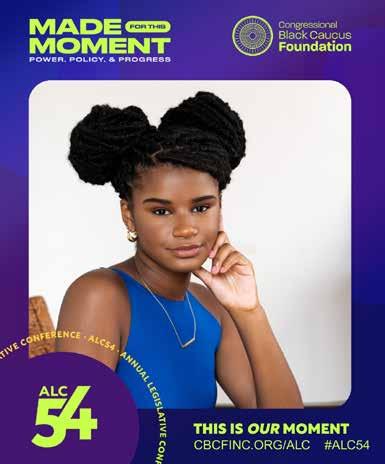
improve GPA, attendance, and graduation rates. Yet it’s precisely these teaching materials—those that tell the truth about race—that are being banned.
The CPAR report found that dropout rates among Black students have dropped significantly, from 10.3% to 5.9%, in districts that implement such curricula. Still, those same gains are threatened by the sweeping anti-CRT legislation spreading across the South.
It’s not just about the classroom. It’s about power. When we erase Black stories, we erase Black futures.
Authors like Toni Morrison and James Baldwin never shied away from confronting racism as a social sickness. Their work refuses to be silenced. They showed us how literature can hold a mirror to our nation’s deepest wounds while offering a roadmap toward healing. This is why I launched THIRD SPACE, a newsletter that explores the intersections of race, arts, and culture.
It’s a space for stories that challenge, inspire, and remember.
THIRD SPACE uplifts Black artists across generations—from Jacob Lawrence and Maya Angelou to Doechii and Erykah Badu—highlighting how resistance is embedded in our creativity. It’s a platform for young people and elders alike to reflect, organize, and build. Because we are not just the future—we are the present.
And right now, we must act. To protect Black creativity and ensure its rightful place in civic life, I offer these steps:
1. Support Black Creators: Buy books by Black authors. Visit Blackled galleries. Gift banned books to young people.
2. Challenge Censorship: Speak up at school board meetings and library hearings. Stay informed and share local news with your community.
3. Create and Uplift Platforms: Encourage young people to share their stories and provide them with platforms. Join or build collectives for Black creatives.
We must follow in the footsteps of those who came before us—our protest singers, our photographers, our freedom fighters. As Gordon Parks used his lens to show injustice, we too must use every tool we have to document and defy. History is not just behind us—it’s unfolding in real time. And it’s our responsibility to archive, paint, and publish the revolution. Subscribe to THIRD SPACE if you want to support underrepresented voices in art and literature. Let’s protect this legacy—not just with words, but with action.
Let us remember: this erasure isn’t accidental. It’s institutional. And it demands an intentional, collective response.
About the author - CBCF NREI Taskforce for Social Justice Ambassador Marley Dias is the founder of #1000BlackGirlBooks, a movement to collect and donate children’s books that feature Black girls as the lead character. WI
By Tylik M. McMillan, CBCF NREI Ambassador
As we uplift the indispensable leadership of Black women, who have long been the backbone of our movements, we must also take a hard look at the role of Black men. Too often, narratives of resistance either sideline Black men as threats or place them on pedestals without accountability. But the truth is, Black men have a responsibility to show up as active co-creators of a liberated future. Our liberation is not just tied to how loudly we speak but how deeply we listen.
As a young Black child, searching for a sense of self in a world that often tried to define me before I could define myself, I wondered: Would I become boxed in by what others expected of me, or would I rise to challenge those expectations and reshape them? I was on a journey to not just find who I was, but to decide what mark I would leave.
Throughout history, we have witnessed Black men from Douglass demanding the right to vote to Lewis shedding blood on the Edmund Pettus Bridge to Obama being sworn as the first Black President, our role has been pivotal. Yet, our engagement in democracy extends beyond the ballot; it is woven into the fabric of activism, policy, and leadership. Visionaries like Rustin, an openly gay Black man and the architect of the 1963 March on Washington, whose brilliance and courage laid the groundwork for civil rights victories.
Our participation is not monolithic. It is intersectional, shaped by race, class, sexuality, and lived experience. It’s woven with pain, beauty, and triumph. But despite these contributions, Black men continue to face significant barriers to full participation. Voter suppression, mass incarceration, economic disenfranchisement, systemic racism, and police violence attempt to marginalize our voices. I have seen this reality firsthand. My father was incarcerated and his absence shaped more than just our family; it shaped my understanding of justice and what “democracy” often fails to deliver.
I grew up knowing that his voice, like so many others behind bars, was silenced not only by prison walls but by policies designed to
erase our presence. His story is not unique, and that’s the tragedy. For many Black children like me, the criminal legal system is not some distant structure, it is home visits to correctional facilities, unanswered questions, and a childhood framed by control rather than freedom.
Yet it is also this experience that sparked my determination. I chose not to be defined by the cycle that ensnared him. Instead, I made it my mission to break and fight for a democracy that values and protects us.
Working under Reverend Al Sharpton and the National Action Network at a young age was nothing short of transformational. I was being shaped as a leader by one of the most prolific voices of our time. Rev and Ebonie Riley taught me that true movement work lives in the tension between the streets and the suites: we march, we organize, but we also legislate and demand accountability.
They instilled in me the importance of intergenerational struggle and how to elevate the voices of the most marginalized, the faintest cries that often go unheard in the noise of politics, and center them in our pursuit.
That lesson in grounded, people-centered movements sharpened my understanding of how injustice operates across systems, in classrooms, courtrooms, and boardrooms.
Today, Black men face higher unemployment rates, lower median wealth, and persistent income disparities compared to white men. These are the manifestation of a broader system that has denied Black men full economic citizenship. Alphonso David, President and CEO of the Global Black Economic Forum, captured this reality plainly when he said:
“A democracy falls short of its promise when it ignores or undervalues millions of its people. A nation that refuses to invest in the full potential of Black men is not one set to succeed.”
Without confronting these disparities, we risk preserving a system where progress is performative, not transformative. True liberation must include dismantling the economic structures that have long exploited Black labor while denying Black
prosperity.
Yet, we are undeterred. I’ve seen it in my peers, a generation of young Black men not like the kid who was boxed in and afraid but unapologetic visionaries who are not just resisting oppression but actively dismantling the systems that sustain it.
So, the question is, am I hopeful in Black men? The answer is yes because I believe in a generation that refuses to accept complacency. A generation that carries the legacy of Douglass, Rustin, Lewis, and Obama not just in memory, but in motion centered in justice, equity, and liberation for ALL. WI
About the author - CBCF NREI Taskforce for Social Justice Ambassador Tylik McMillan is a nationally recognized advocate for justice, equity, and youth power. A proud HBCU graduate and son of the South, Tylik’s work bridges policy and people power to build a democracy that truly serves and represents all.





By Sam P.K. Collins WI Staff Writer
As District officials, residents, activists, and everyone else in between, are attempting to pick up the pieces after the Trump administration’s blatant infringement on home rule, D.C. Del. Eleanor Holmes Norton is working to fight for Washingtonians in Congress.
Norton, now in her 18th term as the District’s non-voting congressional delegate, was mostly quiet after President Donald J. Trump's federalization of the Metropolitan Police Department (MPD), other than press releases about her inquiries into National Guard deployment to the District and her introduction of a measure for bodyworn cameras on federal officers.
Despite The Washington Informer’s best efforts, Norton, via her director of communications Sharon Eliza Nichols, declined an interview. However there are many people with whom Norton worked and interacted with for decades, who are working to uplift the District delegate’s work and legacy.
One of those people— Frank Smith— said District residents, and the youth in particular, have
much to learn from Norton’s life and professional journey, especially at a time when the future looks bleak.
“First, they gotta try to get some schooling for themselves,” said Smith, founding director of the African-American Civil War Museum. “Second, they have to apply themselves…where people could see you are committed, serious, and [will] work hard to fight for them. Congresswoman Norton was able to do that, and that’s what it takes to serve in office. You have to be compassionate and care about people. You have to believe that the government can be a force for good.”
By the time Smith met Norton during Mississippi Freedom Summer in 1964, he had already spent two years as a young civil rights organizer in The Magnolia State. That’s where members of the Student Nonviolent Coordinating Committee (SNCC) were hard at work helping Black residents register to vote.
As Smith recounted, Norton,
then a Yale law student, counted among several young legal scholars who clamored for the opportunity to effect change in the epicenter of Jim Crow.
“It was kind of interesting because the law students were all excited and curious,” Smith said. “They very much wanted to be a part of the process.”
Smith said Norton would ultimately make her mark by using the legal knowledge she had already accumulated to help a comrade in need.
“She just happened to be there when Fannie Lou Hamer ended up in jail in Winona, Mississippi that summer,” Smith told The Informer. “I was tasked with going over to get her out of jail and I told her I need my legal counsel to go with me, and so [Eleanor] and I went over and had the experience of going over two times to get them out.”
After law school, Norton worked as a law clerk to Federal District Court Judge A. Leon Higginbotham, Jr., and later an assistant legal director at the American Civil Liberties Union. She broke barriers in
1977, becoming the first female head of the Equal Employment Opportunity Commission when President Jimmy Carter nominated her for the position.
In 1990, Norton defeated former D.C. Councilmember Betty Ann Kane in the Democratic Primary for the D.C. delegate seat after Walter Fauntroy launched a mayoral bid. She clinched nearly 40% of the vote in the primary contest, and nearly 60% during the general election.
Since taking office in 1991, Norton has never lost re-election.
“She had a curious combination of being somebody who was from D.C. and who had served in the Civil Rights Movement in the deep South. And so she had paid her dues, you might say, and earned her spurs,” Smith told The Informer. “She had a well-stacked resume before she came back here to run for Congress. And so the voters here were really able to replace Congressman Fauntroy… with Norton who had been active in the Deep South with SNCC and a number of other people here in D.C. including Marion Barry, John A. Wilson, David Clarke, Douglass Moore, and others who had known her for years.”
As a House member without a vote, Norton leveraged relationships with white liberal colleagues representing portions of neighboring Maryland and Virginia, along with several blue states. Smith, who served as a D.C. council member during the 1980s and 1990s, said Norton made similar alliances with Black colleagues— including SNCC comrade the late Congressman John Lewis (D-Ga.).
Such a strategy, Smith said, paved the way for the passage of legislation that Norton championed on behalf of D.C. residents— including House Resolution 320, which allowed for the establishment of the African-American Civil War Museum on federal land.
The museum, accompanied by a Civil War memorial bearing the name of 209,145 African-American Union troops, would later open in 1998.
“First bill she got passed to Congress,” Smith told The Informer. “And I'm happy to say we turned it into reality with the African American Civil War Memorial Museum that is sitting there today.”
In 2019, the African-American Civil War Memorial and Museum started undergoing renovations. The museum is scheduled to reopen on Nov. 11. Smith said that NORTON Page 15



events leading up to the grand reopening will pay homage to President Abraham Lincoln and George Washington Williams, the latter of whom served as a Union soldier and advocated for the construction of a civil war memorial.
“The job [was] started by George Washington Williams,” Smith told The Informer. “With the help of Eleanor Holmes Norton, we managed to finish the job.”
Sheila Bunn Speaks about the Warrior on the Hill
During her congressional career, Norton garnered a reputation as D.C.’s “Warrior on the Hill.”
Key accomplishments include the expansion of District home rule to include budget autonomy. During the latter part of the 1990s, Norton also secured the passage of the D.C. College Act, which established the D.C. Tuition Assistance Program, commonly referred to as DCTAG.
However, there are some battles that persist.
Decades after the shutdown of Lorton Correctional Complex, and shipping of D.C. prisoners into the federal correctional system, Norton continues to fight to keep incarcerated District residents in federal facilities close to home -- most recently through legislation. In recent years, she has also continued to advance District statehood, with legislation, as recently as 2021, left to die in the Senate after approval by the House.
Sheila Bunn, a D.C. politico and former Norton staffer, told The Informer that, through it all, Norton has confidence that bolsters her ability to negotiate with political colleagues and nemeses alike.
“There’s no fear with her when it comes to talking to other members of Congress, especially white men,” Bunn said. “It was a no-holdsbarred. She was so successful over the years because for her, being the delegate for D.C. was not just a job or position for her. D.C. is her hometown.”
In 1995, Bunn’s chance encounter with one of Norton’s staffers at the Cherry Blossom Festival led to an interview with the Warrior on the Hill herself. Bunn clinched a role as a scheduler before rising in rank.
By the time Bunn left Capitol
Hill in 2011, she had 16 years of experience under her belt, having served as Norton’s chief of staff and working alongside: veteran political strategist Donna Brazile, former D.C. Councilmember David Grosso, and current D.C. Council members Robert White (D-At large) and Kenyan McDuffie (I-At large).
Bunn counted among her most memorable experiences Norton’s weekly “Government on the Go” events where District residents learned about the latest developments in Congress. As Bunn recalled, Norton also brought tax fairs and job fairs to District communities, nominated talented residents to four service academies, and conducted congressional art shows where young people won scholarships to undergraduate art programs.
“She always instilled in us that you can introduce or get passed as much legislation as you want, but if you are not able to help people with their common problems or their common issues, it doesn't mean a thing,” Bunn said about Norton. “So she is big on constituent services and making sure to not only work on legislation that changes lives, but also making sure, where federal issues are concerned, that she's providing the best constituent services as possible.”
Earlier this year, while running in the Ward 8 D.C. Council special election, Bunn and several other District residents brought the District to Capitol Hill when they lobbied House and Senate leaders for the release of the District’s $1.1 billion that House Republicans froze in a continuing resolution.
The mother of a high school student, Bunn said that, well before Republicans threw the District’s budget into a state of limbo, she used lessons she learned from Norton to navigate the political realm while running a council campaign and juggling parenthood.
“Congresswoman Norton’s older child has Down Syndrome, so you got to witness the parent side, the human side. You don’t just get to see that highly motivated staunch D.C. advocate,” Bunn told The Informer. “You got to see that softer side of her.”
These days, Bunn serves as an add-on committee member with the D.C. Democratic Party. That role allowed her, as recently as the 2024 presidential election, to con-
vey the importance of D.C. statehood to Democrats from other states. Though she acknowledges her late father, James Bunn, as her master teacher in civic engagement, Bunn said that Norton emphasized the importance of coalition building in the furtherance of a goal.
“I learned that you have to stand up and fight, even if you’re by yourself,” Bunn said. “It’s also about being able to galvanize other people to join your cause to show them the importance of why you need
“Congresswoman Norton’s older child has Down Syndrome, so you got to witness the parent side, the human side. You don’t just get to see that highly motivated staunch D.C. advocate,” Bunn told The Informer.
to push back against these attacks. Making sure that people understand that statehood, voting rights, all of that is at its basis a civil rights issue.”
It’s Time for Norton to Pass the Baton
Throughout her long tenure in Congress, Norton hasn’t been without her critics— including Kymone Freeman, co-founder of We Act Radio.
In stating his qualms about her record, Freeman said Norton didn’t act voraciously enough about the closure of Columbia Hospital for Women and D.C. General. Freeman also questioned the degree to which Norton has championed the location of convicted District residents to federal correctional facilities within 250 miles of the District.
“It has to be within driving distance [but] under her tenure, that has not been enforced,” Freeman told The Informer. “Making D.C. inmates go all over the country— Florida, Pennsylvania, Colorado—
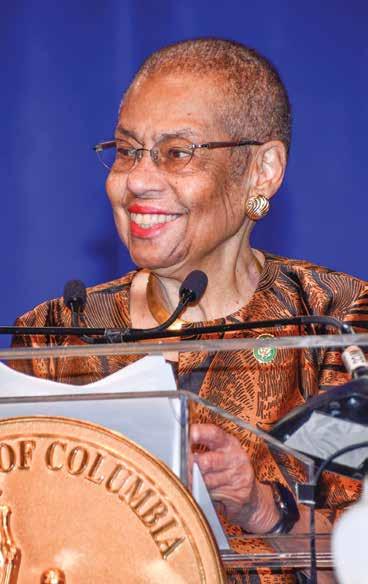
and these poor people are not able to see their loved ones. It further destroys families and cements the disconnection of family bonds because of that incarceration.”
Freeman expressed plans to run for Norton’s seat in 2026. This run will follow his unsuccessful 2024 attempt to unseat the delegate, who he said has been complicit in the U.S.’ financing of the genocide in Gaza.
As Freeman recounted, Norton declined to sign on to a demand for a ceasefire, telling him during their face-to-face encounter that doing so would be premature.
“We both shared the same mentor [in] Dr. Dorothy Height, who led not one, but two delegations to the World Conference on Racism in 2001 in South Africa,” Freeman said. “And the only countries in the entire world that walked out of that conference in attendance were America and Israel over this very issue. So her position on this policy was made clear, and for [Norton]
to deviate from that and capitulate to establishment Democrats…was unacceptable.”
Throughout much of the second Trump presidency, Freeman has counted among those on D.C. streets standing up against what many call the most intense infringement on D.C. home rule in 50 years. While he expressed appreciation for Norton’s service, Freeman told The Informer that, in the current political climate, District residents deserve a more radical warrior on the Hill.
“If we don't have a vote, we should have a voice, and that voice should be a radical voice that's fighting for us, not someone that's trying to make friends on Capitol Hill,” Freeman said. “That is passe. She's done it for decades. It's a valid effort on her part, but it's a wasted effort when we look [at] her efforts and apply that conventional wisdom going forward.”
WI


By Darrell Booker
In the last five years, diversity, equity, and inclusion (DEI) went from boardroom buzzwords to front-page culture war targets. Once hailed as a moral and business imperative, DEI is now being declared “dead” in some circles, with companies rolling back initiatives under legal pressures, political scrutiny, or social fatigue.
But let’s be clear: while the label may be under siege, the mission remains.
The real work of equity has never been limited to corporate ERGs (Employee Resource Groups) or DEI reports. It has always lived in our local communities: in the nonprofits led by Black and Brown women, in mutual aid networks, and faith-based organizations. These are the spaces where equity was being fought for long before DEI entered PowerPoint slides, and they are the spaces we must now double down on.
This moment isn’t about mourning the loss of DEI as we knew it. It’s about recommitting to the broader, bolder vision of equity—and being honest about what it’s going to take to get there:
DEI has too often lived as a compliance exercise—optics over outcomes. Today, the backlash is revealing what was always true: performative gestures won’t withstand political pressure.
The solution? Purposeful, embedded action. Corporations must move from reactive statements to proactive partnerships. That means backing community-based organizations with multi-year, unrestricted funding—real investments in leadership, infrastructure, and sustainability.
The Congressional Black Caucus Foundation (CBCF) recently issued a call to action for businesses in their Corporate Social Responsibility (CSR) guide, urging them to "go beyond mere financial contributions" and instead adopt "a clear stance on distinct societal matters" through a genuine racial equity lens (CBCF, 2023). This shift is necessary if equity is to be treated as a strategy rooted in business and civic responsibility.
Local community-based organizations have always been the backbone of social progress. They understand the nuance of their communities’ needs and are trusted in ways that corporations and government often are not.
To empower them, we must:
• Invest in Capacity: Provide access to capital, data tools, training, and mentorship to scale


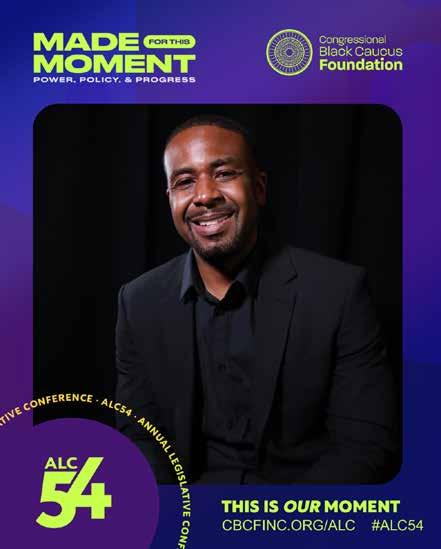
their impact.
• Build Bridges: Foster intentional collaborations between grassroots leaders and corporate or government decision-makers.
• Elevate Voices: Include these organizations not just as implementers but as co-creators in policy, program design and strategic planning.
The CBCF CSR guide underscores this, asserting that racial equity efforts are best advanced when "community voices and leadership are centered, respected, and resourced." Businesses that want to play a role in systemic change must partner with—rather than speak for—those already doing the work on the ground.
Technology is not neutral. AI can either exacerbate inequities or help solve them—it depends on how it is designed.
Let’s harness this moment of AI transformation to serve equity goals:
• Data Equity: Help local orgs access and analyze data to better target services, apply for funding, and demonstrate impact.
• Language Access: Use AI tools to offer multilingual resources and communications.
• Resource Matching: Build tech platforms that connect communities to services, donors to missions, and volunteers to causes.
Corporations with AI expertise have a moral opportunity to support nonprofits and government partners in using these tools ethically and effectively.
In today’s polarized climate, even the word “equity” can trigger political back-
• Be Proxies for Progress: Use your influence to direct resources, open doors, and protect the space for others to lead.
• Support Elected Officials Who Get It: Partner with policymakers who understand that thriving communities are good for everyone— both morally and economically.
Equity is not a solo sport. It requires activists, corporations, governments, and community organizations working together with shared goals and mutual accountability.
Let’s stop waiting for top-down mandates and start building bottom-up momentum. Host community summits, form cross-sector task forces, align around measurable outcomes. The problems we face are too complex for siloed solutions.
The CBCF's CSR guide calls on “C-Suite executives, small business leaders, and organizations to explore the transformative power of responsible corporate leadership” through partnerships and transparent metrics. This isn’t charity—it’s systems redesign.
If you're a corporate executive, ask yourself: are we still in this fight, or were we only here for the photo ops?
If you're a government leader, ask: are we funding equity for real, or just managing public perception?
If you're in community, know this: your work is more important than ever—and there are people in power who are ready to stand beside you.
Let’s stop treating DEI as a political football and start treating equity as what it has always been: a human imperative, a moral responsibility, and a blueprint for a better future.
The acronym may fade. The hashtags may fall silent. But the mission lives on.
And so must we.
Congressional Black Caucus Foundation. (2023). Where Do We Go from Here? A Guide to Advance Racial Equity Through Environmental, Social, and Corporate Governance. https://www.cbcfinc.org
About the author - As a technology leader and Ambassador for CBCF’s NREI Taskforce for Social Justice, Darrell Booker has a profound passion for bridging innovation, culture, and community impact. From developing enterprise applications to leading Microsoft’s Nonprofit Tech Acceleration program, he’s empowered thousands of organizations with digital transformation strategies.
WI
Greater Washington Empowering Communities. Changing Lives.
Urban League
Over 10,000 families supported annually through impactful programs and initiatives.
6,500 households assisted each year with rent, utility support, and personalized counseling.
$40,000 invested annually in educational scholarships and youth leadership development.
85+ years of driving progress and elevating the Black community in the Greater Washington Area.
$156M distributed annually across transformative programs and services.
The largest affiliate in the National Urban League movement, leading the charge for change.
184 hours of mental wellness sessions provided annually, offering small group and individual therapeutic support.
Creating economic mobility through financial literacy, wealth-building initiatives, entrepreneurship, and career advancement opportunities.
We salute your bold leadership, your policies, and the progress that continues to move our communities forward.
We know community is the foundation of power. For over 85 years, we’ve been connecting families across the DMV to resources that uplift, stabilize, and empower. From housing and entrepreneurship to financial advocacy and education, our mission is clear: to build pathways of opportunity and strengthen the systems that sustain them.
Every family we serve, every entrepreneur we support, every voice we amplify is proof of the transformative power of our work.
Through these pillars, we continue the tradition of community service that defines our legacy.
Today’s challenges demand bold, intentional action.
We are proud to say: We are made for this moment.
Empowering People. Strengthening Communities. Building Futures.


By Stacy M. Brown and Micha Green WI Senior Writer and WI Managing Editor
As African Americans continue to face health disparities, the Congressional Black Caucus Foundation (CBCF) works to combat the inequities through targeted work and action.
From the organization’s “Policy for the People: Health Equity Summit,” held in Washington, D.C. in May, to this year’s CBCF Annual Legislative Conference (ALC)– featuring panels and programming geared toward improving Black health– the foundation prioritizes promoting wellness as a step toward overall justice and equity.
“Together, we are equipping lawmakers, advocates, and changemakers with the tools they need to enact policies that move us closer to equity and justice for all,” said CBCF President and CEO Nicole Austin-Hillery during the May summit, which was held just as the foundation and Joint Center for Political and Economic Studies released “Forward Together: Black Policy Playbook for an Equitable America.”
A roadmap for advancing racial equity across multiple policy areas, Austin-Hillery told participants that the new playbook is meant to connect research to action.
The collaborative playbook identifies seven areas of focus, including health care access, education equity, voting rights, economic opportunity, workforce development, criminal legal system reform, and technology policy.
Each section includes evidence-based recommendations aimed at dismantling structural barriers.
Austin-Hillery described the collaboration with the Joint Center as “the power of partnership in advancing thoughtful, data-driven solutions to the complex challenges facing Black communities.”
The Policy for the People: Health Equity Summit in May


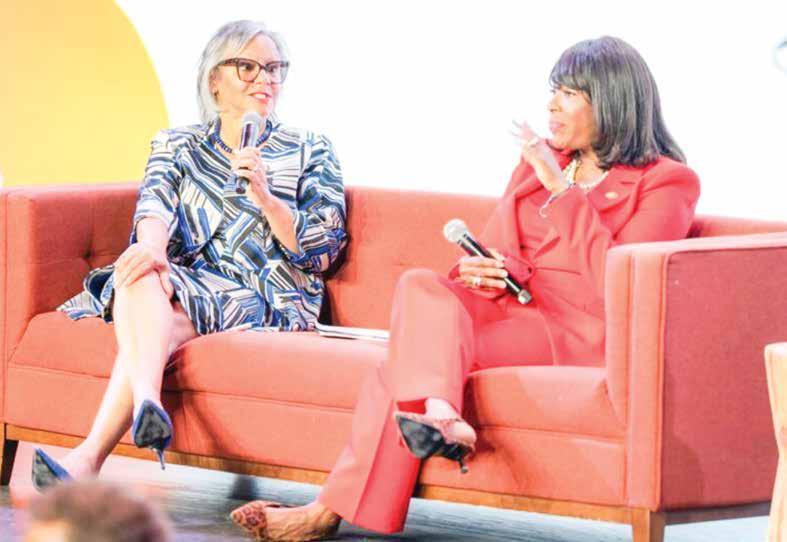
furthered the organization’s commitment to promoting wellness, addressing inequities and combating chronic diseases for African Americans.
Held at Capitol Turnaround, the summit featured a health fair, breakout sessions, and an opening roundtable with Austin-Hillery, Joint Center President Dedrick Asante-Muhammad, CBCF Chair Rep. Terri Sewell (D-Ala.) and Rep. Robin Kelly of Illinois (D).
The discussion centered on chronic diseases such as cancer, diabetes, and heart disease, as well as the ways affordability and access continue to limit care for Black families.
Rep. Robin Kelly told participants that chronic disease outcomes for Black communities reveal systemic injustice. She pointed to the need for greater investment in preventive care and for policies that remove cost barriers for lifesaving treatment, as well as more intentional engage-
ment with community members to promote positive health outcomes.
“I think we need to work on changing health care so it’s community based, not from the top down,” Kelly said, garnering a large applause from the crowd and her colleagues. “When you think about COVID, it was those trusted messengers, the people that were hired to navigate that really made the difference. And I think we need to go back to that–the people that are closest to the issue and listen to them to solve the problems."
Breakout sessions explored prescription drug costs, culturally competent care models, and the importance of building a more diverse healthcare workforce, while the health fair brought together providers and service organizations to connect directly with the community.
The release of the playbook alongside the summit created a unified push for reform, combin-
ing policy vision with community engagement. Both initiatives underscored that inequities in health, education, and economic opportunity are interconnected and require coordinated action.
Dedrick Asante-Muhammad explained the importance of linking the summit to the playbook.
“The Joint Center and the Congressional Black Caucus Foundation were founded to advance the social, political, and economic status of Black Americans, and this policy agenda and partnership furthers that promise,” he said. “We are honored to engage in this critical partnership between the Joint Center and the Congressional Black Caucus Foundation, and we thank the additional partners who provided crucial input.”
As chair of the foundation, Sewell emphasized the importance of the playbook in combating inequities.
Dr. Jonathan Cox, vice president of CBCF’s Center for Policy Analysis and Research, emphasized the importance of the playbook as it relates to challenges African Americans are facing nationwide.
“This is a pivotal moment for Black Americans,” Cox asserted. “History has shown us that progress is often met with resistance. However, we remain steadfast in our commitment to ensuring that Black communities have the resources, rights, and opportunities
“Organizing and mobilizing is so critically important, speak up and fight back,” the Alabama congresswoman said. “And that’s why when you have this playbook, to have stats and numbers and figures to back up what you’re saying, is so critically important.”
comcastcorporation.com/projectup
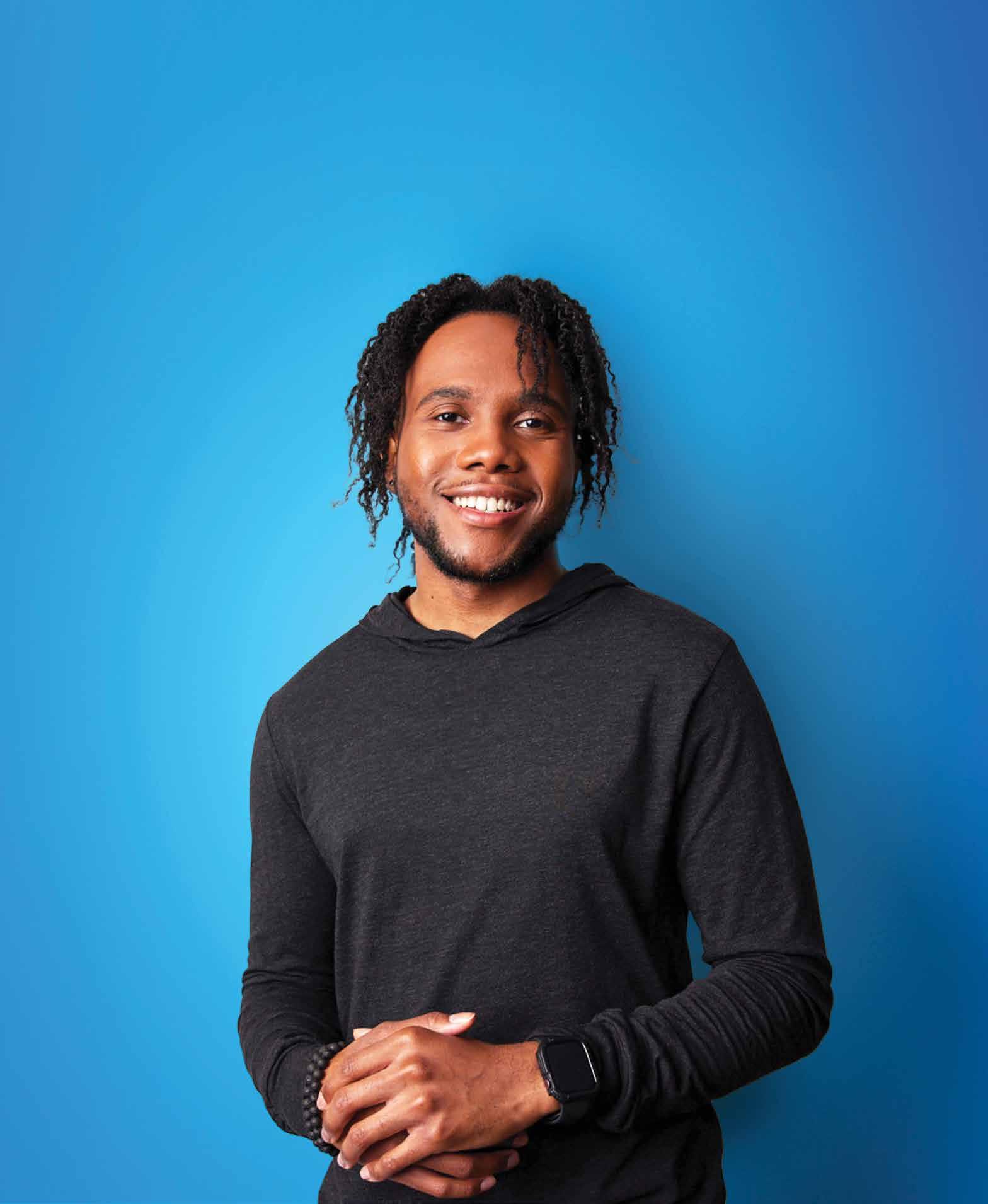
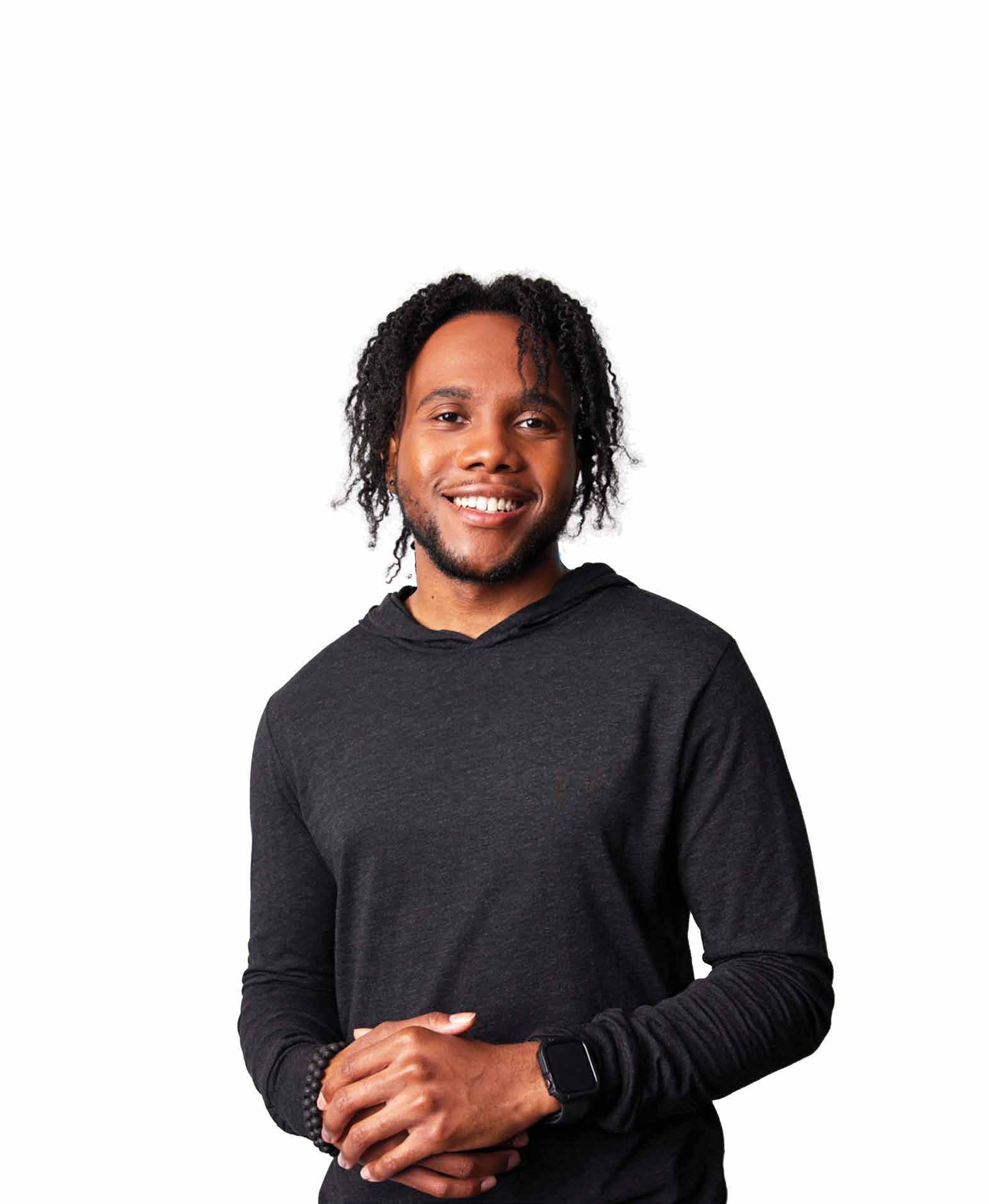
By James Wright WI Staff Writer
For the past 33 years, the Wilbourn sisters use the month of August to prepare to showcase their designs during the Congressional Black Caucus Foundation’s (CBCF) Annual Legislative Conference (ALC) that takes place each September in Washington, D.C.
Despite President Donald Trump federalizing the city’s Metropolitan Police Department last month, criticizing District officials for not effectively fighting crime, and threats of another takeover, the owners of Wilbourn Sisters Designs, based in Atlanta, Georgia, are excited about coming to the nation’s capital for the 54th ALC Sept. 24-28.
“That doesn’t affect us or deter us,” said Carolyn Wilbourn, a co-owner of the business, who lives in Los Angeles, California. “Coming to D.C. and participating in the Annual Legislative Conference is a part of our business. We will participate in this event until the day we die.”
The Wilbourn sisters will be part of scores of large corporations, medium and small businesses and nonprofits of all sizes that will make up the exhibit hall, as part of the annual conference held at the Walter E. Washington Convention Center in Washington, D.C.
Known informally as the vendors expo, the event attracts tens of thousands of people who attend the conference, and it encompasses such activities as book signings, author readings, cooking demonstrations, performances and showcasing the latest technology.
However, there has been a concern that the expo hall may not generate the type of participation from some corporations this year due not only to the federal takeover of the District’s law enforcement apparatus, but also the Trump administration’s attack on the diversity, equity and inclusion (DEI) programs of corporations and colleges and universities.
U.S. Rep. Terri Sewell (D-Alabama), who serves as CBCF chair



5
of the Board of Directors, said there have been rumblings from some corporate supporters about their role in the Expo this year but members of the Congressional Black Caucus have a response.
“The corporations come to us and ask for our help for their businesses and projects,” Sewell told the Informer. “We do what we can, but we also expect them to support our constituents and what we are trying to do, too.”
Nicole Austin-Hillery, president and CEO of the foundation, also emphasized the importance of the vendors’ participation in the annual conference.
“The ALC is not only a premier policy forum, it is a cultural and community experience,” said Austin-Hillery. “This year’s theme, ‘Made for This Moment’ comes to life through a vibrant and diverse lineup of vendors and exhibitors who embody innovation, entrepreneurship, and a deep commitment to preserving and advancing our culture and vision.”
Wilbourn Sisters Designs specializes in women’s clothing for special occasions ranging from soft flowing ensembles to wrapped dresses that fit all sizes.
“We design clothes for women who know who they are,” said Carolyn Wilbourn, 68. “We fit women of all nationalities. At the
and others wanting African garb.”
Janice Wilbourn, who manages operations in Atlanta, said notable women have become clients through attending the expo.
“Our first major client was Rep. Corrine Brown (a former Democratic member of Congress representing Florida from 1993- 2017, and [Rep.] Maxine Waters (D-Calif.) came along and would buy our stuff,” said Janice Wilbourn, 64. “Congresswoman Diane Watson was also a steady client. The good thing about the expo is that it exposes us to movers and shakers and it empowers businesses like ours.”
Ann Hodges, the owner of Anne’s Beautiful Creations based in Fayetteville, Georgia, has also participated as an annual vendor. A women’s retail clothing business, Hodges travels throughout the country to promote her products in trade shows and expos.
Hodges said her business, which she co-founded with her husband, has been a constant at the ALC for seven years. When asked why she participates, she simply said for “exposure and networking.”
She also noted being a participant in the expo has been beneficial and is not bothered by what is going on in the District, and the president’s impact on the city.
The Wilbourn sisters will join scores of major corporations, midsize and small businesses, and nonprofits showcasing in the exhibit hall during the annual conference at the Walter E. Washington Convention Center in Washington, D.C.
ALC, we tend to deal with women who like fancy outfits, with some wanting standard clothing
“I don’t agree with the present administration,” Hodges said. “I feel that we as a people must continue to live and not let this be a distraction.”
Austin-Hillery is hopeful that vendors will come to the expo to network with customers and make money and not become distracted with what is going on outside of the conference.
“From Black-owned businesses and socially conscious brands to cutting-edge tech and educational partners, these vendors represent the creativity, resilience, and brilliance of our community,” the CBCF president said. “We invite every attendee to explore, support, and engage with the wide range of offerings that celebrate Black excellence and elevate the ALC experience.”
WI @JamesWrightJr10



By Brandon Todd VP Government Affairs Policy & Advocacy
For more than 177 years, Washington Gas has proudly supported the advancement of communities across the D.C. region—providing affordable, reliable and safe energy that creates good-paying jobs that fuel opportunity and promote economic growth.
Affordability matters more than ever to the over 1.2 million customers we serve today. Whether it’s heating a home or cooking a family meal, our customers want their energy to be affordable. Fortunately, natural gas remains an affordable energy choice for families and businesses. Households that use natural gas for heating, cooking, and clothes drying save an average of $1,132 per year compared to those using electricity for the same needs1
On average, only 1 out of 650 gas customers will experience an outage in their lifetimes1. Washington Gas is proud to have a 99% reliability rating. That means that when a storm hits and the power goes out, our

Brandon Todd is the VP Government Affairs Policy & Advocacy for Washington Gas (WGL). He leads the government affairs and public policy team and is responsible for developing and managing public policy positions. He previously served six years on the Council of the District of Columbia, representing Ward 4. Brandon is active across the metropolitan Washington region, serving on business and philanthropic boards.

customers still have access to an energy source to keep them safe.
This combination of affordability and reliability is why 8 in 10 DMV residents support the right to choose natural gas in their homes and businesses 2. It’s also why more than 50,000 new homeowners and businesses have become Washington Gas customers in the last five years. Energy choice is essential for maintaining a resilient, diverse, and flexible energy future.
As we continue to evolve alongside our customers, Washington Gas remains committed to delivering affordable and reliable energy that keeps the National Capital Region growing.
[1] American Gas Association Playbook, “Natural Gas Advancing America,” 2024
[2] Public Release Survey of Natural Gas Customers in DC, VA, and MD, Conducted September 11 – 22, 2024






By James Wright WI Staff Writer
Alabama U.S. Rep. Terri Sewell is a living embodiment of the 54th Congressional Black Caucus Foundation(CBCF) Annual Legislative Conference in Washington, D.C. from Sept. 24-28: “Made For This Moment: Power, Policy & Progress.”
“Black America is under threat in the second Donald Trump presidency,” said Sewell, chair of the Congressional Black Caucus Foundation board of directors. “Diversity, equity and inclusion (DEI) is under attack and DOGE is cutting the jobs of hardworking people. He is attacking the vulnerable communities that Congressional Black Caucus (CBC) members represent and that is why this Annual Legislative Conference is so important. This is the first large gathering of its type since 2024 and our people need to be energized and to work collectively to make change.”
The foundation is a 501C3 nonprofit designed to create and imple
ment programs and initiatives that the Congressional Black Caucus champions. The Annual Legislative Conference is a major activity of the foundation, bringing in tens of thousands of people throughout the world to Washington to discuss issues facing people across the African diaspora.
“The conference advocates and educates Black leadership serving a global Black community,” Sewell told The Informer. “There are lots of workshops and brain trusts with experts from almost every field. The topics that are explored deal with the various problems Black people in America and the world face.”
The first Black woman to represent Alabama in Congress, Sewell has served in the U.S. House of Representatives since 2011.
While she was born 60 years ago in Huntsville, Alabama, Sewell spent much of her formative years in Selma, a city that was the heart of the 1965 battle for voting rights in the U.S.
The first Black valedictorian of Selma High School, Sewell received a bachelor’s degree from Princeton University–where she befriended future first lady Michelle Obama–and St. Hilda’s College, Oxford, where she becameclose to Susan Rice, a District resident who would become a U.S. United Nations ambassador and national security to President Barack Obama.
She was also a schoolmate of Obama’s at Harvard Law School, where she received a juris doctorate. While pursuing her education, she interned for Alabama U.S. Senators Richard Shelby and Howell Heflin.
“I have known Terri since law school, and she has always been a strong voice and tireless advocate for the people of Alabama,” Obama told the Alabama Political Reporter in April 2014.
Her professional career included becoming a securities lawyer for Davis, Polk & Wardell and a public finance attorney for Maynard, Cooper & Gale, where Sewell became the first Black woman to make partner. She decided to enter politics when she heard Obama give a speech about the importance of public service in 2007.



Sewell ran and won the Democratic primary and the general election in 2010-- not only becoming a barrier breaker in that role as an African American, but one of the first women elected in a regular election by that
“I decided to get into politics because I am a daughter of Selma,” Sewell said. “My city has its place in history. My mom served on the Selma city council, and she was an amazing role model. I had a community that nourished me and grew up in an environment of public service.”
Birmingham Mayor Randall Woodfin has emphasized the strength of Sewell’s leader-
ship and work in Congress, urging voters in his city to send her back to Washington on Election Day last year.
“You all should vote for Terri Sewell,” said Woodfin. “She represents us well. We should have her continue to represent us in the Congress.”
In the House, Sewell sits on the influential Ways & Means Committee and is the ranking member of the Subcommittee on Oversight. She is also a member of the House Administration Committee and serves as the top Democrat on the Subcommittee on Elections.
The Alabama congresswoman is the chair of the Congressional Black Caucus Voting Rights Task Force and is co-chair of both the Congressional Voting Rights Caucus and the New Democrat Coalition Health Care Task Force.
In addition, Sewell is the author of the John R. Lewis Voting Rights Advancement Act of 2025, which would restore the Voting Rights Act to its fullest power by reinstating the requirement for jurisdictions with a racist history to have their laws and practices cleared by the U.S. Department of Justice before changes can take place.
“Serving with John Lewis in the Congress taught me that it was alright to get in ‘good trouble,’” said Sewell, about the late Alabama-born leader who represented Georgia in Congress.
“The bill in his name will restore protections of the Voting Rights Act. That bill was a hard fight that was won.”
Sewell also is authoring a bill that would make civil rights legend Rosa Parks’ birthday a national holiday.
“Dec. 1 is Rosa Park Day,” said Sewell. “One act of defiance sparked a movement. There is no national holiday honoring a woman, and she should be the first. I make it my business to honor luminaries in my district and she is one.”
Even though Sewell is one of 435 voting members of the House, her work has not gone unnoticed. While Sewell has distinguished herself as
3U.S. Rep. Terri Sewell, chair of the Congressional Black Caucus Foundation, is a Democrat representing the Seventh Congressional District in Alabama. (Courtesy Photo/U.S. Congress)
a champion of African Americans, women and people of low incomes, she has also made a mark on rural communities.
“Sewell has emerged as champion for the electric cooperatives that serve the rural residents she represents,” according to an August 2021 piece in Rural Electric Magazine.
The magazine explained Sewell played a pivotal role in supporting co-ops as the lead Democrat House sponsor of the RURAL Act, a bipartisan bill stopping co-ops from losing their tax-exempt status when they accept government grants to rebuild after natural disasters, provide broadband service to rural communities or develop clean energy projects.
From her work with the RURAL Act, according to the magazine, Sewell received the 2020 Eminent Service Award from the Alabama Rural Electric Association.
“Congresswoman Sewell remembers her roots of growing up in rural Alabama as she truly represents her district and the state each day,” says Karl Rayborn, president and CEO of the association.
Obama has also attested to Sewell’s dedication and political acumen and said so in one of her bids for re-election.
“In Congress, Terri has stood by me through the implementation of the Affordable Care Act, and we've stood up to Republicans who've tried to roll back our progress time and time again,” the former president said in 2014. “Terri has been working tirelessly to promote job creation and investment in skills training and workforce development.”
More than 11 years later, Sewell is still fighting hard for the people of Alabama, marginalized communities, and equal rights for all Americans. She looks forward to encouraging the thousands gathering in Washington, D.C. for this year’s CBCF Annual Legislative Conference to also work toward equity and justice for all.
“John Lewis told us ‘to keep your eye on the prize,’” said Sewell. “We continue to have the will to fight. Progress is elusive and every generation has to fight. Every fighter needs to replenish and that is what this conference does for those in the struggle.”
WI @JamesWrightJr10



Vivian Browne, Bini Apron, 1973, Acrylic on canvas, 49 3/4 x 51 3/4 in., The Phillips Collection, Gift of Adobe Krow Archives for Vivian Browne, Los Angeles. © Vivian Browne; Courtesy of RYAN LEE Gallery, New York and Adobe Krow Archives, Los Angeles; Rik Freeman, Frutos de Mar, 2013, 48 x 60 in., Oil on canvas; Keith Crown, Midwestern Illinois Land, 1971, Watercolor on paper, 30 x 22 3/4 in., The Phillips Collection, Gift of Ray Kass, 1981


By Stacy M. Brown and Micha Green WI Senior Writer and WI Managing Editor
Congresswoman Yvette Clarke of New York’s Ninth Congressional District stands at the helm of the Congressional Black Caucus (CBC) during one of the most politically charged periods in modern American history, serving as a brave voice standing up for civil rights, justice and equity for all.
“Make no mistake: in this volatile political landscape, the CBC must stand as the resistance to the extremist ideologies of Project 2025 as the conscience of Congress to advocate and advance the Black diaspora,” Clarke said in a statement when she was first elected chair in December 2024, before issuing a call to action.
A senior member of the House Energy and Commerce Committee and a lifelong Brooklyn resident, Clarke is the daughter of Jamaican immigrants and a steadfast advocate for the communities that shaped her.
Since first arriving in Congress in 2007, she has made it her mission to continue the legacy of trailblazers like the late New York Rep. Shirley Chisholm, the first Black woman and Caribbean American elected to Congress.
“In my capacity as chair, I will ensure that our Caucus’ goals are accomplished by focusing on voting rights, education, criminal justice reform, women’s rights, health care equity, and economic equality,” she emphasized. “I am committed to working with my colleagues to call out this extremist agenda and [will] fight like hell for a pathway forward.”
Clarke’s leadership draws on her identity as a Black woman and Caribbean American, experiences that have shaped her work to champion women, children, and immigrants.
She co-chairs the Congressional Caucus on Black Women and Girls and is recognized for taking


on systemic inequities through a legislative agenda that centers the most marginalized.
Her tenure as CBC Chair comes at a time when diversity, equity, and inclusion (DEI) initiatives face unprecedented rollback under the second Trump administration.
“President Trump promised to work to lower costs and spur economic growth for all American communities,” Clarke said, days after Trump’s inauguration, in a January 2025 statement. “Instead of working to create economic opportunities that will allow Americans to get ahead, build generational wealth, and achieve the American dream, President Trump on day one of his administration signed an executive order to systematically dismantle all diversity, equity, and inclusion initiatives within the federal government.”
In the 118th Congress, Clarke introduced measures such as the Menopause Research Equity Act, the Stephanie Tubbs Jones Uterine Fibroid and Education Act, and the Uterine Cancer Study Act, all aimed at advancing women’s health.
She has also led on tech policy, authoring the DEEPFAKES Accountability Act to combat malicious AI-generated content.
Her infrastructure vision includes the Smart Cities and Communities Act, which promotes technology-driven urban development while bridging the digital divide.
Clarke has also forged bipartisan partnerships, including co-leading the Doctors in Our Borders Act to address physician shortages by allowing more U.S.trained foreign doctors to remain and serve in underserved areas.
“Congesswoman Yvette Clarke was inspired to serve by her mom’s example and lessons on the necessity of women’s voices in shaping communities,” Rep. Nancy Pelosi (D-Calif.) said in a March 2022 Women’s History post on X, formerly known as Twitter. “She delivers on health, education,
housing and jobs for [New York’s ninth Congressional District] and fights for at-risk-immigrants."
Clarke has been one of the most forceful critics of the Trump administration’s law enforcement overreach. She condemned the takeover of the D.C. Metropolitan Police and deployment of the National Guard as a “blatantly racist and despicable power grab” and warned that it could be a “test run for broader authoritarian overreach.”
In response to Trump sending Marines to Los Angeles to confront protests, she called the move an “authoritarian escalation unlike any before in American history.”
She said Trump’s actions rose to the level of impeachable offenses.
Speaking on behalf of the CBC, the New York congresswoman also spoke out against the Trump administration’s decision to take over D.C.’s Metropolitan Police Department (MPD).
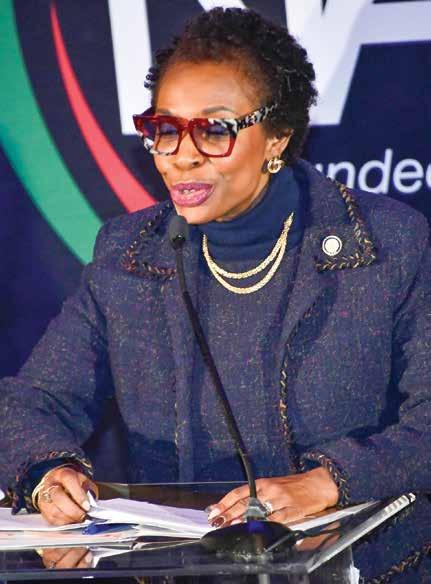
“President Trump does not care about keeping Washington, D.C., or any of our communities safe,” Clarke and the CBC noted in an August statement. “Taking over local control of the D.C. Metropolitan Police and deploying the National Guard under the guise of public safety puts residents in danger. This unprecedented attack on D.C. home rule is a blatantly racist and despicable power grab, and it won’t stop in Washington, D.C.”
A co-chair of the Congressional Caribbean Caucus and a daughter
of Jamaican immigrants, Clarke has consistently championed all people of the Caribbean diaspora and particularly the Haitian community.
In July 2025, she welcomed the U.S. District Court for the Eastern District of New York’s decision to extend Temporary Protected Status (TPS) for Haitian nationals until February 2026.
Clarke called the ruling a lifeline for Haitians facing political, economic, and humanitarian crises, while urging the administration to push for permanent protections and long-term stability for Haiti.
“Since the announcement that TPS would end in September for hundreds of thousands of Haitian migrants, my colleagues
and I have relentlessly urged the Trump administration to extend protections for our most vulnerable neighbors,” said Rep. Clarke. “Haitian-Americans have contributed immensely to our communities and our economy for decades... We must continue to encourage this administration to do everything in its power to save lives and bring stability to Haiti and security to its people. And that begins with extending Temporary Protected Status for those who need it most.”
The New York congresswoman also unapologetically fights for immigrants.
In 2021, Clarke told colleagues she welcomed more immigrants CLARKE Page 36
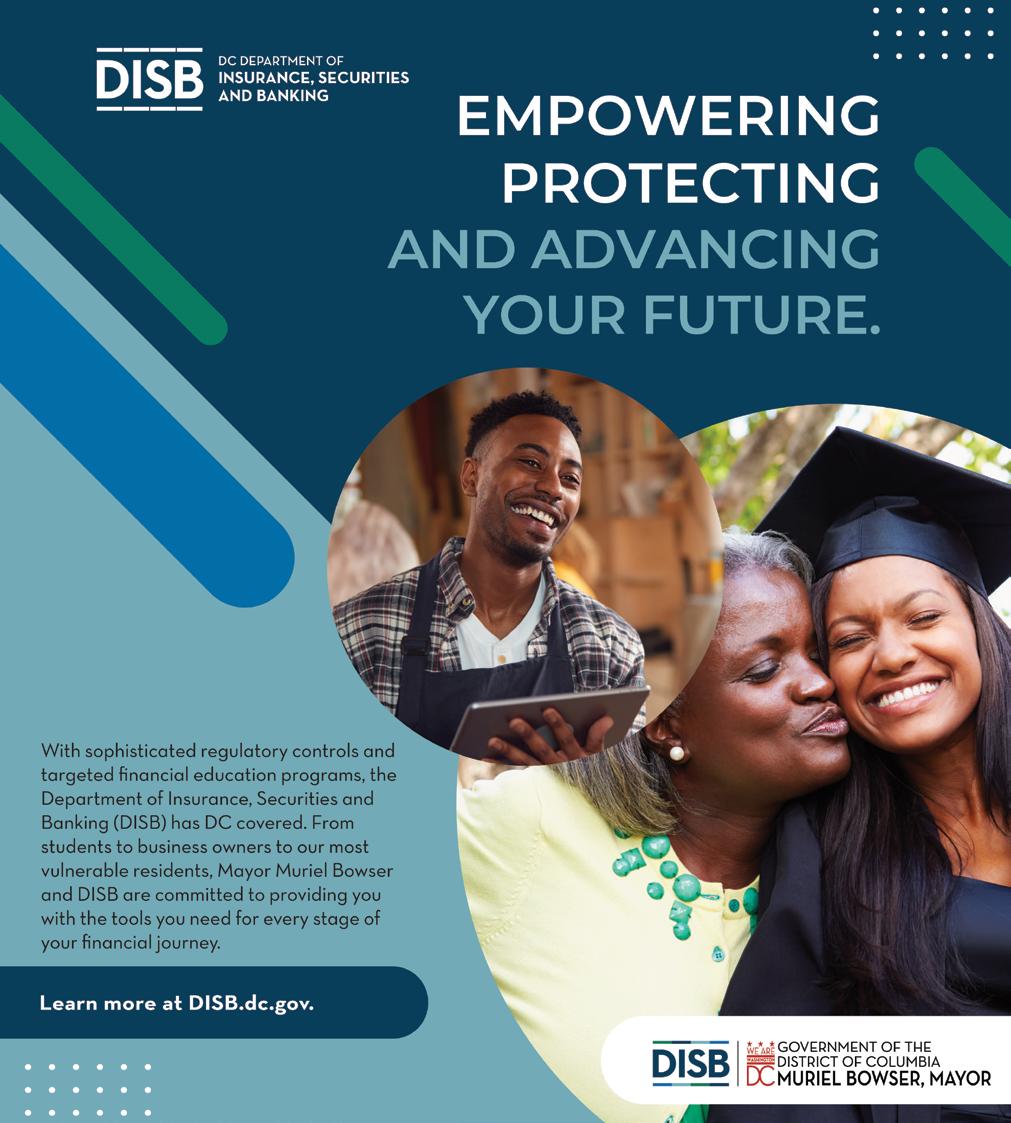





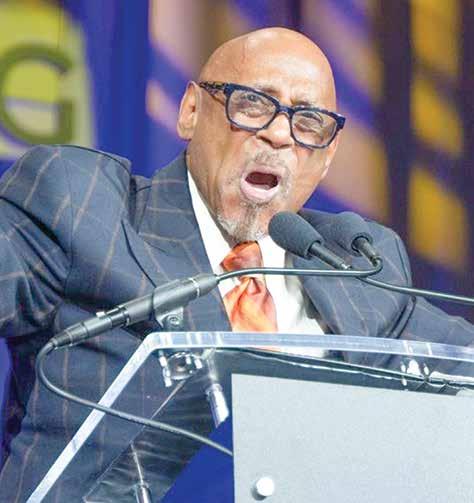

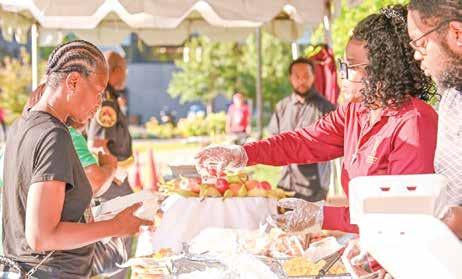


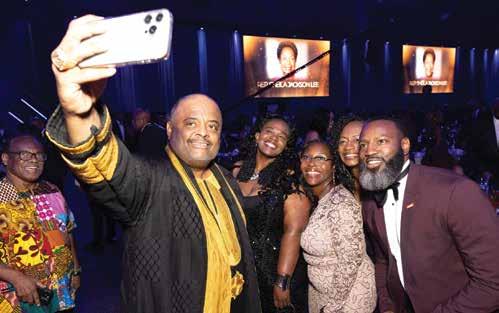



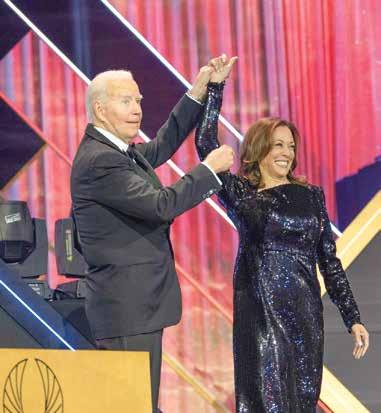



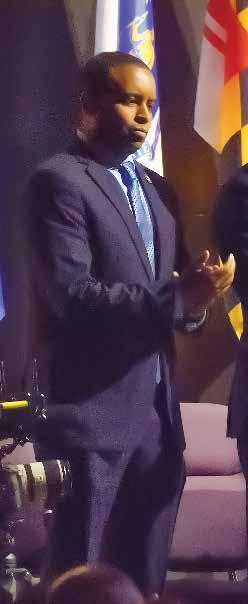
By Stacy M. Brown WI Senior Writer
Rep. Joe Neguse has quickly become one of the most influential members of Congress, blazing a trail not only for his constituents in Colorado’s 2nd District, but for Black leadership across the country.
Later this month, Neguse will serve as co-chair of the Congressional Black Caucus Foundation’s Annual Legislative Conference, a role that places him at the center of one of the most important gatherings of Black lawmakers, policy experts, and community leaders.
The son of Eritrean immigrants, Neguse made history in 2018 when he became the first Black person to be elected for Congress in Colorado. At 41, he now represents one of the state’s largest and most rural districts, covering more than 12,000 square miles, larger than eight U.S. states.
“We are in a defining moment for Black America — one where our collective power, civic engagement and policy influence are shaping the future of this nation,” Nicole Austin-Hillery, president and CEO of the foundation, said in a statement. “With leaders like Senator [Angela] Alsobrooks and Congressman Neguse helping guide this year’s conference, we are poised to deliver one of the most impactful gatherings to date.”
Neguse’s reputation as an effective lawmaker is well known.
The nonpartisan Center for Effective Lawmaking named him one of the most productive legislators in the country, ranking him the second most effective House Democrat in March 2025.
He authored the second-highest number of laws of any member in the 118th Congress and has received recognition as the most bipartisan member of Colorado’s congressional delegation.
Further, his work spans some of the most urgent issues of the day.
The barrier-breaker introduced legislation to reverse cuts made by the Trump administration to federal disaster preparedness and emergency response agencies, including NOAA, the National
Weather Service, and FEMA.
“As we continue to face increasing numbers of natural disasters across our country, wildfires, floods, and hurricanes, it’s critically important that we equip our communities with the resources they need,” Neguse said when unveiling the Protect Americans from Climate Disasters Act.
He also pressed the U.S. Forest Service for answers on dire conditions facing federal wildland firefighters, highlighting concerns about understaffing, poor protective equipment, and unsafe working environments.
In July, Neguse led a lawsuit against the Trump-Vance administration for obstructing congressional oversight of federal immigration detention facilities.
“Blocking members of Congress from oversight visits to ICE facilities that house or otherwise detain immigrants clearly violates Federal law — and the Trump administration knows it,” Neguse said. “Such blatant disregard for both the law and the constitutional order by the Trump administration warrants a serious and decisive response, which is why I’m proud to lead the lawsuit.”
Neguse’s rise within Democratic leadership has been swift.
In March 2024, his colleagues unanimously elected him House Assistant Minority Leader, making him the first Coloradan in nearly 90 years to hold a senior leadership role. He previously served as an impeachment manager during President Donald Trump’s second trial and today is the ranking member of the House Subcommittee on Federal Lands.
His focus on consensus-building has been evident throughout his career.
The Colorado congressman pioneered “Service Town-Halls,” bringing federal agencies directly to his constituents. That innovation earned national recognition and underscored his belief that public service means active engagement with the people he represents.
“We had a packed house of folks from across the political spectrum: Republicans, Democrats, folks with no political affiliation at all, asking us tough questions,” Neguse said in a video posted on X on Sept. 7, where he conducted his 16th town hall of
the year in Eagle County, Colorado. “We don't do prescreened questions at our town halls. We do these town halls because we want to make sure that we're accountable to the people that we serve.”
Before entering Congress, Neguse served as the executive director of Colorado’s consumer protection agency under the governor’s cabinet, recovering millions for consumers and advancing legislation to combat fraud against seniors.
Earlier, he was elected to the University of Colorado Board of Regents, where he pushed to make higher education more affordable and accessible. A summa cum laude graduate of the University of Colorado-Boulder and later the University of Colorado Law School, he built his career on expanding opportunities for others.
His drive is rooted in his family’s story. His parents immigrated from Eritrea with little more than determination, becoming naturalized citizens and instilling in him the value of service.
Today, Neguse and his wife, Andrea, live in Lafayette, Colorado, where they are raising their two young children, Natalie and Josh.
As co-chair of the CBCF Annual Legislative Conference, Neguse will help guide discussions at a time of major challenges and opportunities for Black communities.
His record of advancing bipartisan legislation, standing firm on oversight, and defending vulnerable populations closely mirrors the conference, which officials said is to chart a course for progress and empowerment.
Neguse’s peers applaud his leadership, both in Congress and in the community, which those close to him note continues to build on his parents’ vision of giving back to a nation that gave their family opportunity.
“He’s in the mix,” Rep. Eric Swalwell (D-Calif.)— who served with Neguse on the impeachment team that prosecuted Trump after the Jan. 6 attack— told NBC News in May 2024. “He’s had a meteoric rise.” WI




“THE BLACK PRESS OF AMERICA IS MORE RELEVANT THAN EVER”
The NNPA Salutes the 2025 Congressional Black Caucus Foundation Annual Legislative Conference
The National Newspaper Publishers Association (NNPA) is a trade association representing the Black Press with 235 African American member newspapers across the nation in 40 states and the Districtof Columbia.Since NNPA's inception, more than 84 years ago, its publishers have provided excellent reporting. Black newspapers are the trusted voice of the Black community, reporting the news from a Black perspective.
Celebrating 198 Years of The Black Press in America






By Hamil R. Harris WI Contributing Writer
As lawmakers and Americans around the nation grapple with the effects of President Donald Trump’s elimination of diversity, equity and inclusion, attacks on Black history, and recent takeover of D.C.’s Metropolitan Police Department (MPD), the Congressional Black Caucus Foundation (CBCF) hopes this year’s Day of Healing on Sept. 27 will offer hope and inspiration, during a time of uncertainty.
“I am praying for protection but this prayer request seems odd because we are being occupied by those outside the city by those who say that they are here for protection,” said the Rev. Thomas Bowen, Earl L. Harrison Minister of Social Justice and Congregational Care at Shiloh Baptist Church in Northwest, D.C.
Despite disparities, repressive policies, and the federal takeover of MPD, this year’s Day of Healing, part of the 54th Annual Legislative Conference (ALC), will work to uplift Black communities and feature the Rev. Dr. Howard John Wesley–pastor of the Alfred Street Baptist Church in Alexandria, Virginia–as the keynote speaker, with a performance from Anthony Brown & group theraAPy.
“I am deeply honored and humbled to serve as keynote speaker at the CBCF’s 54th Annual Day of Healing Prayer Breakfast,” Wesley told The Informer. “In these challenging and divided times, I feel the weight and responsibility of discerning what the word from the Lord is
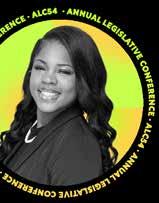



to help us endure and survive.”
As honorary co-chair of this year’s annual conference, Sen. Angela Alsobrooks (D), Maryland’s first Black senator, emphasized the importance of healing during this challenging time for the nation and world.
“As an African American community we have centered our faith around everything that we have done for so many years,” Alsobrooks said. “Bringing together policy makers, community members in fellowship and reflection is a source of strength for us.”
In her first year as a United States senator, Alsobrooks noted how all the workshops, programming and policy discussions are critical toward positive progress and combating racism, injustice and hate.
“It all works together,” Alsobrooks said, “to heal generational wounds that have hurt the Black family.”
As Republican lawmakers work to extend the takeover of MPD and introduce discriminatory legislation, the Rev. E. Gail Anderson Holness, senior pastor of the Adams Inspirational African Methodist Episcopal Church in Fort Washington, Maryland, and a former advisory neighborhood commissioner has a particular prayer leading up to the Day of Healing.
“My prayer is that God would release us from the hands of the enemy,” Holness told The Informer, adding that the annual Day of Healing emphasizes the importance of prayer to combat challenges. “The Bible says we must pray without ceasing unless our works are dead.” WI














By Stacy M. Brown WI Senior Writer
Jonathan Cox believes that equity is not optional but fundamental to America’s future.
As vice president of the Congressional Black Caucus Foundation (CBCF) Center for Policy Analysis and Research, and lead author of “Forward Together: The Black Policy Playbook for an Equitable America,” Cox helped craft a detailed roadmap to remove systemic barriers and build opportunity for Black communities.
The CBCF has released the playbook ahead of its Sept. 2428 Annual Legislative Conference (ALC) in Washington, D.C. The document outlines strategies to close racial gaps in wealth, health, education, and justice, while also protecting democracy itself.
"The Playbook, co-developed with the Joint Center for Political and Economic Studies, centers on seven key policy areas toward equity: voting rights and civic engagement; economic opportunity and advancement; workforce; education; health care; criminal legal system reform; and technology and telecommunications.
“An equitable America is one where structural and systemic barriers that produce racial disparities in all aspects of life such as wealth, health, education, and political power are removed,” Cox said.
He added that federal, state, and local governments must make intentional investments in communities historically excluded from opportunity. That means universal access to affordable health care, fair housing practices, living-wage jobs, strong worker protections, access to voting, and technology policies that guarantee broadband access while preventing algorithmic bias.
Cox pointed to federal investments and tax policy as the fastest way to close the racial wealth gap.
“Lawmakers can make targeted federal investments and tax-policy changes that expand wealth- and asset-building opportunities for Black families,” he said.
Such investments in Black communities include: expanding the Child Tax Credit, strengthening


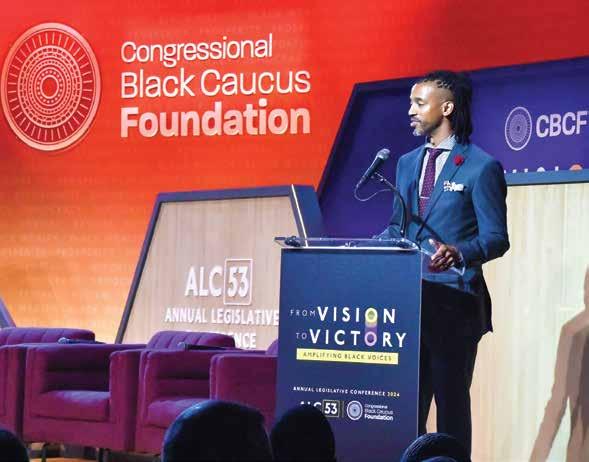
the Low-Income Housing Tax Credit, protecting Special Purpose Credit Programs, and supporting Community Development Financial Institutions and Minority Depository Institutions.
As African Americans also fight for health equity, Cox called for a comprehensive federal approach.
“Health equity for Black Americans is of vital importance, as it impacts quality and length of life, financial stability, and more,” he said.
Expanding coverage and Medicaid protections, investing in community health, scaling telehealth, standardizing maternal care, and providing culturally inclusive services are among the recommendations.
The playbook also details reforms needed in education.
“Lawmakers should protect and strengthen accountability for the Department of Education, inclusive of programs like Title I, special education, and borrower and student protections,” Cox said.
He urged support for HBCUs,
“An equitable America is one where structural and systemic barriers that produce racial disparities in all aspects of life such as wealth, health, education, and political power are removed,” Cox said.
stronger K–12 funding, and legislation like the Books Save Lives Act to counter curriculum censorship.
Criminal justice reform remains a top priority.
“In order to safeguard Black political power, as well as preserve democracy, a multi-pronged approach is needed,” Cox insisted.
He pointed to the Freedom to Vote Act and the John R. Lewis Voting Rights Advancement Act as vital measures to protect access to the ballot.
Further, he emphasized the importance of younger freedom fighters in the work toward justice and equity.
“Young leaders play an integral role in pushing progress policies and creating momentum for change,” Cox said. “They are the movement’s accelerants, mobilizing voters, shaping public narratives, holding institutions accountable, piloting community solutions like digital access and restorative-justice programs, and serving in policymaking spaces.”
He stressed that CBCF intends for the playbook to be both a roadmap and a tool for accountability.
“Prioritize eliminating mandatory minimums, reform bail and pretrial detention, create independent police oversight, require transparent disaggregated policing data, expand diversion and reentry programs, and enact sentencing guidelines that weigh mitigation and rrehabilitation,” Cox told The Informer. “Aggressive expungement for low-level and cannabis convictions with reinvestment in affected communities must also be part of the process.”
Cox added that accountability must extend to the private sector as well.
“Federal and state governments can leverage public-private partnerships with accountability conditions that facilitate greater equity,” he noted. That includes tying federal infrastructure dollars to equity benchmarks, requiring suppliers to include certified minority businesses, and insisting on measurable hiring and outreach commitments.
The playbook links equity to the defense of democracy.
“We provide policymakers with evidence-based research and policy assistance, and coordinate with the Playbook’s contributing organizations to push for legislative action and local change,” Cox said.
The CBCF emphasized the importance of the "Forward Together: The Black Policy Playbook for an Equitable America.”
“Rooted in rigorous research and a deep understanding of longstanding disparities,” the CBCF wrote, “the Playbook provides actionable tools to advance justice and opportunity for Black Americans.”
As the CBCF ALC conference approaches, Cox made clear what is at stake.
“Equity is not optional, it is necessary for the success of our nation,” he said. “When Black Americans are supported and uplifted, the entire country benefits, and that success requires concrete, measurable policy action across civic engagement, wealth-building, health equity, education, justice, workforce, and technology. The Playbook is a practical roadmap. Use it to move from rhetoric to enforceable policy, measurable targets, and sustained political will.” WI



CLARKE from Page 26
into her district “just for redistricting purposes.”
CBC Legacy and Forward Strategy
Clarke is the ninth woman to lead the CBC, joining a line of Black women chairs who have steered the caucus during politically volatile periods.
She has pledged to focus on protecting civil rights, expanding economic opportunity, and defending democracy itself.
From her Jamaican and Brooklyn roots to her leadership on Capitol Hill, Clarke’s political career is defined by unwavering advocacy for justice, equity, and the empowerment of marginalized voices — work she now leads on a national stage during a defining moment for the country.
friend of mine, has shown tremendous leadership this year as chair of the CBC. She has worked to embrace the African diaspora within the Black identity,” Rep. Oye Owolewa, the District’s shadow representative in Congress, told The Washington Informer. “As a Nigerian American child of immigrants, I believe that bridge between continents is important in solving today’s issues involving income inequality, achievement gaps and systemic racism.” WI
“Rep. Yvette Clarke, a close 4 D.C. Shadow Rep. Oye Owolewa, Dr. Bernice Duma, and Rep. Yvette Clarke. As the son of Nigerian immigrants, Owolewa celebrates Clarke’s commitment to uplifting immigrant communities. (Courtesy Photo)
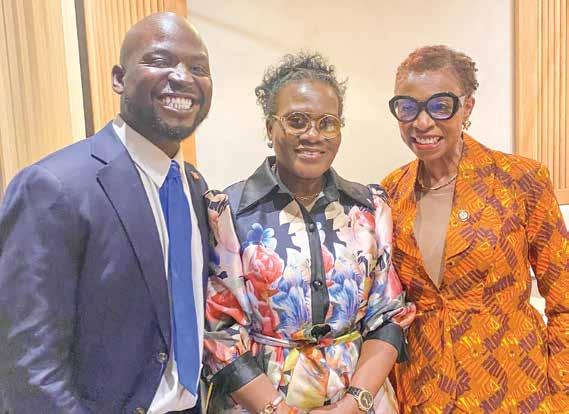

ALSOBROOKS from Page 10
4Guests attend the health fair at the “Policy for the People: Health Equity Summit,” hosted by the Congressional Black Caucus Foundation in May in Washington, D.C. (Courtesy Photo/CBCF) Local Leaders, Residents Celebrate Alsobrooks’ First Year in the Senate
Having supported her since early in her Senate campaign, Prince George’s County Councilmember Calvin Hawkins (D) is proud of Alsobrooks’ work and track record.
He called her the “most effective and consequential leader to serve as county executive,” and remains excited about the work she is doing in the Senate. “I honestly do not believe any of the former county


executives could have responded to the COVID-19 pandemic as effectively as she did. Angela’s leadership was unmatched as she brought together and collaborated with federal, state, and local political, economic, religious, and civic leaders. She demonstrated intellectual competency, political savvy, and immeasurable empathy as she responded to the worst—by far—health, social, and economic crisis to ever impact Prince George’s County,” Hawkins told The Informer. “One of my most rewarding and treasured experiences was the opportunity to witness-first hand, up-close Angela Alsobrooks’ tenure as Prince George’s County

Executive.”
Democratic Central Committee
Chair Sylvia Johnson also lauded Alsobrooks’ years of leadership, from Prince George’s County’s state’s attorney, to county executive, and now Maryland senator.
“From Prince George’s County to the United States Senate, Angela Alsobrooks has led with integrity, vision, and impact. Now Maryland’s first Black U.S. Senator, she brings that same commitment to public service: championing reproductive freedom, trade transparency, health equity, and infrastructure priorities that uplift working families,” Johnson told The Informer, before
to thrive.”
Amid cuts affecting Medicare and Medicaid with the Trump administration’s “One Big Beautiful Bill,” this year’s CBCF ALC will feature several panels and activities promoting overall wellness for Black Americans.
“It’s important and timely that CBC Foundation addresses health equity during these times. As D.C.’s only elected pharmacist, I’m very concerned about the impact of 25,000 working class Washingtonians being recently kicked off Medicaid,” Rep. Oye Owolewa, the District’s shadow representative
looking toward the future. “The Prince George’s County Democratic Central Committee looks forward to working alongside the senator as she seeks transparency and economic justice in government.”
WI
4Sen. Angela Alsobrooks, Maryland’s first Black senator, speaks at the Women’s Equality Day Luncheon hosted at The Hotel at the University of Maryland on Sept. 12. (Robert R. Roberts/ The Washington Informer)

told The Informer. “I hope local and national leadership find ways to ensure every D.C. resident has access to affordable health care.”
Sewell offered a call to action in the work toward true equity.
“I think all of us have a role to play. We as lawmakers must legislate where we can, mitigate where we can, develop policy where we can, but the most important is public sentiment,” she said during the May summit, encouraging people to speak out against injustices such as unequal access to care and other health disparities. “Never underestimate the power of sentiment.”
WI
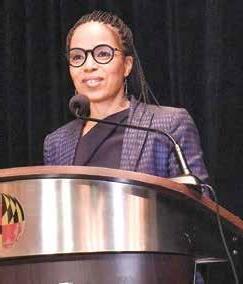





By LaToya B. Parker and Dedrick Asante-Muhammad
In August 2025, the Black unemployment rate surged to 7.5 percent—about twice the rate for White workers (3.7 percent) and well above the national average of 4.3 percent. Washington, D.C., and Michigan had the highest Black unemployment rates in the second quarter of 2025, at 10.3 percent and 10 percent, respectively (EPI). These numbers are not mere statistics— they signal families set back, dreams delayed, and communities left more vulnerable each time the economy falters. For Black Americans, downturns hit harder, and recovery is slower. In these moments, only true wealth infrastructure—assets, homeownership, savings, and entrepreneurship—can anchor families and offer a genuine path forward. As federal layoffs accelerate and key industries shed workers, families without assets face a familiar crisis: unemployment that threatens not just monthly bills, but housing stability and children’s futures. Black workers bear the heaviest burden, losing jobs first and finding new ones last each time the economy turns. One model stands out: the Family Self-Sufficiency (FSS) program, HUD’s proven approach for helping low-income families turn rental assistance into long-term wealth. As participants’ incomes rise, so do their savings—thanks to an innovative escrow account that captures what otherwise would have gone toward higher rent. By graduation, many families have enough for a down payment, tuition, or even a small business venture. With $141 million in federal appropriations for 2025, FSS is a rare example of scalable, bipartisan anti-poverty policy—yet it faces perennial funding threats that put its gains at risk (HUD; Bipartisan Policy Center). Asset-building programs like FSS, which Congress has protected even as recent budgets have targeted them for cuts, are essential to help families weather unemploy-



As federal layoffs accelerate and key industries shed workers, families without assets face a familiar crisis: unemployment that threatens not just monthly bills, but housing stability and children’s futures.
ment, avoid eviction, and create security that income alone cannot guarantee. In the wake of these disruptions, Black wealth infrastructure isn't just important; it is essential for community and generational resilience. The effects are visible in lives transformed. Take Marisabel, who entered the FSS Homeownership Track in Massachusetts as a renter struggling to get ahead. Through steady work, saving, and coaching, she bought her first home—turning uncertainty into lasting security for her family. Likewise, Tanisha Durrett,
a single mother, became the proud owner of a bookkeeping business after completing FSS, crediting the program’s financial coaching for her leap into entrepreneurship (New Albany Housing Authority).
However, even diligent saving can’t close the racial wealth gap alone. The pathways to prosperity increasingly run through new engines of economic growth—like clean energy, a $23 trillion market by 2030, expected to generate over a million jobs in the coming years.
Yet Black Americans currently hold only 8 percent of jobs in the sector
and own less than 1 percent of its companies. Even as industry leaders clamor to hire—“We need to hire 500,000 people in the next decade,” says Jason Grumet of the American Clean Power Association (Washington Informer)—systemic barriers persist.
Chief among these obstacles is unpaid training. As CEO Carla Walker-Miller notes, “If you want [Black people] to be trained, pay us… We need to be paid while we’re trained” (Washington Informer). Without paid opportunities, participation remains limited—no matter how dire
the labor shortage. For those who do break in, union positions offer real security: 8–19 percent higher wages and strong benefits (Climate Power Clean Energy Jobs Report). Most new roles require no college degree, making these jobs especially valuable for displaced workers.
Business ownership—vital for family and community wealth—remains out of reach for many. Fewer than a quarter of Black-owned clean energy companies get bank financing, compared to nearly half of white-owned firms. This persistent financing gap prevents Black entrepreneurs from scaling up and sharing new opportunities.
Programs like FSS, the Dearfield Fund for Black Wealth, and DC’s Black Homeownership Fund reveal what’s possible. These efforts turn passive hope into asset-building action, helping families achieve homeownership, launch businesses, and stabilize entire neighborhoods.
To create lasting resilience, we must do three things: Expand asset-building programs like FSS and down payment supports nationwide so every hardworking family can own a home and build security. Open pathways to emerging industries with paid training, union jobs, and fair business opportunities. Reform lending and homeownership systems with targeted community investments and strict anti-discrimination rules.
If policymakers act with purpose—grounded in evidence— Black families will not only weather economic storms, but thrive: launching businesses, sending children to college, and building communities with enduring strength. True wealth infrastructure is more than a safety net—it’s the foundation for real and lasting mobility. There is no Black mobility without Black sustainability.
Dedrick Asante-Muhammad, is president of the Joint Center for Political and Economic Studies, and Dr. LaToya Parker, is a senior researcher.
WI


Each year the Congressional Black Caucus’ Annual Legislative Conference provides days of innovative sessions, enriching dialogue, and necessary calls to action for attendees. Most amazing events generate goals lists and provide opportunities to network that bring about real, lasting positive change. To ensure you keep track of your goals, new friends (and potential colleagues) and points of inspiration, here is a handy page for your notes. – WI
Key Things I’ve Learned…

I Will Apply this Information to Daily Life By…
Large Goals:
Small Goals to Move Towards My Large Goal Based on What I’ve Learned…
Methods to Achieving those Goals…




SEPTEMBER 24–28, 2025
Walter E. Washington Convention Center
WASHINGTON, D.C.

SATURDAY, SEPTEMBER 27, 2025
7:30 A.M.




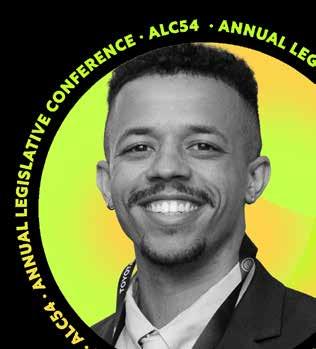

SATURDAY, SEPTEMBER 27, 2025
7:00 P.M.